When you buy through our links, we may earn a commission. Products or services may be offered by an affiliated entity. Learn more.
Best Cheap Mattresses of 2026
Quality Beds That Don't Break the Bank
If you’ve ever slept on a saggy or lumpy mattress, you know there’s a difference between an inexpensive mattress and a cheap mattress. I know because I’ve slept on more than a few myself, and my back hurts just thinking about them.
Balancing quality and cost is tricky, and researching all the mattresses out there gets exhausting really quickly. So, I’ve done a lot of the work for you. (Well, my testing team and I.) Having tested 2,000 mattresses over the past decade, we’ve found a handful that we think are a really excellent value.
Our Top Pick: Brooklyn Bedding CopperFlex Memory Foam
We selected the Brooklyn Bedding CopperFlex Memory Foam as the best affordable mattress of 2026. For a mattress that currently costs under $500 for a queen, the material quality is superb, and we loved the balance between pressure relief and support that the bed provides.
Our Top Picks
Best Overall
:Brooklyn Bedding CopperFlex Memory Foam
Shop Now
Best Mattress for Back Pain
:Bear Original
Shop Now
Best Mattress for Side Sleepers
:Nectar Classic
Shop Now
Best Mattress for Combination Sleepers
:Leesa Original
Shop Now
Best Temperature Regulating Mattress
:Layla Essential Mattress
Shop Now
Best Hybrid Mattress
:Silk & Snow Hybrid
Shop Now
Best Organic Mattress
:Awara Natural Luxury Hybrid
Shop Now
Best Mattress for Couples
:DLX Essential
Shop Now
Best Cooling Mattress
:SweetNight CoolNest
Shop Now
Best Mattress for Guest Rooms
:Dreamfoam Hybrid
Shop Now
Best Mattress for Teens
:Siena Memory Foam Mattress
Shop Now
Best Mattress Deals Happening Right Now
- Save $150 — Brooklyn Bedding CopperFlex Memory Foam
$449(List Price $599) - Save $299 — Bear Original
$699(List Price $998) - Save $450 — Nectar Classic
$649(List Price $1,099) - Save $333 — Leesa Original
$999(List Price $1,332) - Save $150 — Layla Essential Mattress
$549(List Price $699)
How We Tested the Best Cheap Mattresses
Testing Criteria
When it came to testing out the best affordable mattresses, there were a few key factors we were looking for aside from price. Since every mattress in our roundup is less than $1,000, we looked to prioritize construction and durability — this is because cheaper beds may sometimes use materials that aren’t as high-quality, but we aimed to find options that blended top-tier performance with a wallet-friendly price tag.
We did this by testing out performance categories like:
- Motion isolation: This is how much movement you can feel from the other side of the bed
- Pressure relief: This refers to how well a mattress relieves pressure, pain, or soreness from your natural pressure points
- Temperature control: How warm or cool a mattress can be, which depends on its materials and design
- Edge support: This is how well the edge of a mattress can hold your weight without collapsing or sinking
- Ease of movement: How easy (or hard) it is to get out of a bed when moving across its surface
How We Evaluated
When evaluating affordable mattress options, we first started off with a meta analysis of our database, which consists of more than 2,000 beds! About 800 of them have a price tag of less than $1,000, so we used existing testing data and construction analyses to choose our top 40 for additional in-depth testing.
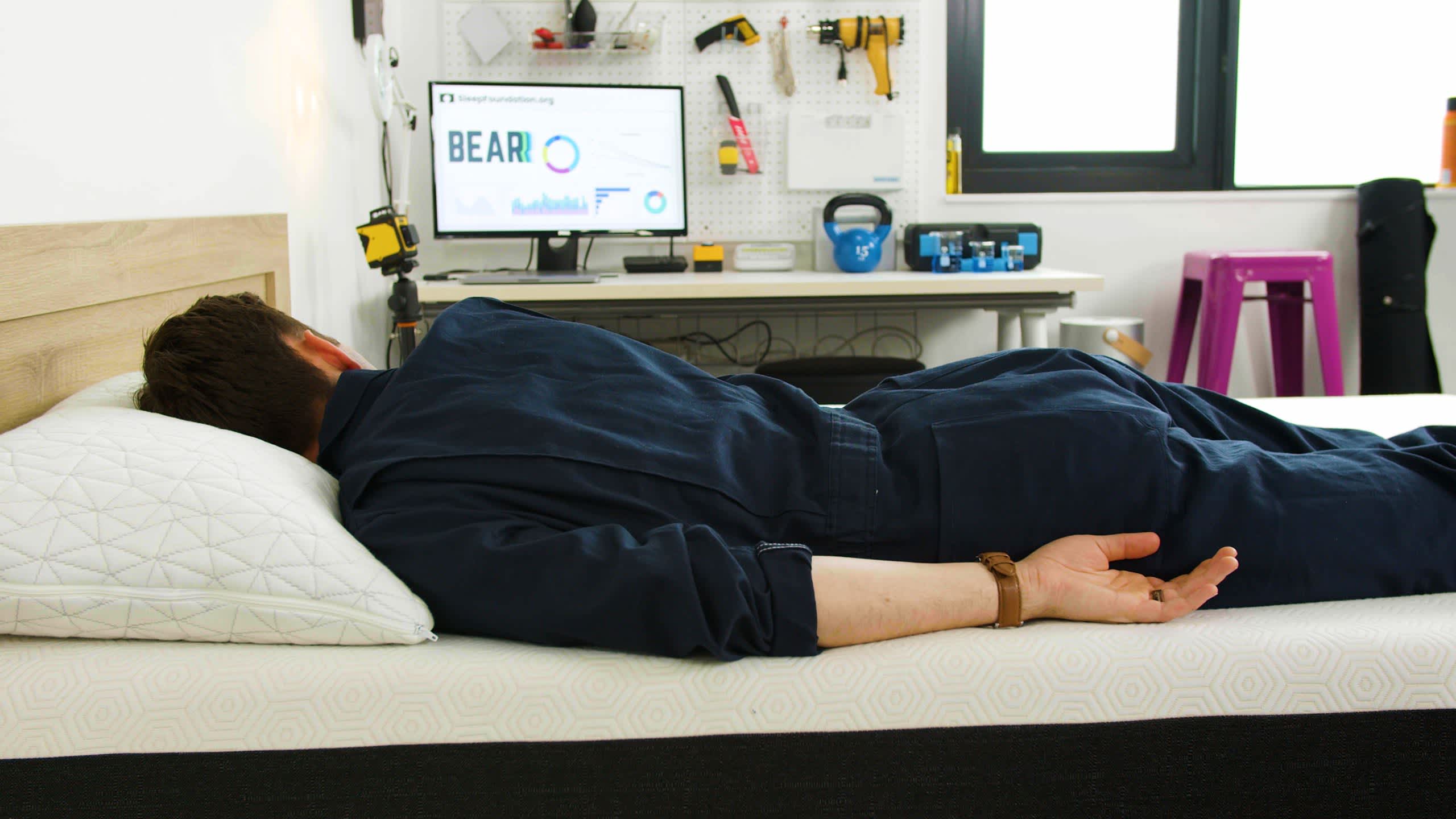
From there, it was all about lab, field, and user testing: In our Seattle Test Lab, our team thoroughly evaluated each of the top 40 mattresses. We had members of our testing team take home one of the beds to sleep on for up to two weeks to see how a mattress performs in real-world environment. We also collected data from more than 34,000 verified customer reviews to determine whether our team’s findings match real-world experiences.
Our Testing Team

Logan Foley
Editorial Director
Full Bio

Mary Fenton
Head of Product Content
Full Bio

Jeremy Klein
Senior Product Testing Manager
Full Bio

Brad Nehring
Senior Product Analyst
Full Bio

Colin Simpson
Product Research Manager
Full Bio
Best Overall: Brooklyn Bedding CopperFlex Memory Foam
Best Overall
8.6/10Test Lab Score
Brooklyn Bedding CopperFlex Memory Foam
Hugs and soothes pressure points for restful sleep.
Key Details
- Who It’s Best For: Side sleepers at least 130 pounds and back sleepers less than 230 pounds. Couples and hot sleepers can benefit, too.
- Feel: Medium firm (6). Plush and adaptive without excessive sinkage around your midsection. Dissipates most (but not all) heat from the surface.
- What It’s Made Of: Comfort system of adaptive foam over two memory foam layers, all encased in a Euro-top cover. Fourth layer of zoned, transitional polyfoam. Cover made of GlacioTex fabric.
- What We Don’t Like: Initial odor that can linger up to 72 hours after unboxing. Too soft and lacking in support for stomach sleepers 130 pounds or more.
Scoring & Reviews
The following ratings show how suitable this mattress is for different sleeping positions and sleeper weights. These scores are determined by how well the mattress supports and relieves pressure for each sleeper type.
In addition to the hands-on feedback from our team, we conduct a number of quantitative tests in our Test Lab. The below ratings are based on the experience of our testers.
SELECT AN ICON TO VIEW DETAILS:
Motion Isolation
The CopperFlex Memory Foam provides great motion isolation, with our testers clocking almost no motion transfer across the bed during movement. This is due to the all-foam construction—with memory foam comfort layers and an all-foam base, there is little means for one side of the bed to affect the other.
Pressure Relief
This bed provides excellent pressure relief, which notably reduced pressure on the shoulders and hips compared to other beds. With a thick foam comfort layer and a foam base, the bed conforms close to the body and ‘hugs’ the sleeper quite a bit.
Temperature Control
As an all-foam bed, the CopperFlex is inevitable going to trap a decent amount of body heat. Luckily, the top layer of quilted polyfoam isn’t very dense, allowing for some airflow. We don’t find copper-infused foam to make too much of a difference in cooling.
Edge Support
Like most all-foam beds, the edge support of the CopperFlex memory foam is mediocre. The high density support core provides a bit of support, but there’s definitely some noticeable sinkage when sitting around the edges. Perhaps not the best choice for those with mobility issues.
Ease of Movement
As an all foam bed with a memory foam comfort layer, it’s no surprise that our testers found the CopperFlex Memory Foam a bit hard to move around on. The foam conforms close to the body, giving you that sinking sensation, and it definitely requires a bit more effort to roll around on the bed, especially for heavier sleepers.
Durability
The CopperFlex Memory Foam’s expected lifespan is about 5 to 6 years with proper use and regular rotations. This is average for an all-foam model. The topmost layers will eventually develop impressions and indentations that make the surface feel uneven, but the base layer is dense enough to provide several years of solid reinforcement.
One of Brooklyn Bedding’s newest models is the CopperFlex Memory Foam, a six-layer mattress that delivers ample cushioning and isolates motion well. A cooling copper infusion in the top layer also allows the CopperFlex to sleep noticeably cooler than many competing foam models.
How It Performs
During hands-on tests, our team noticed the CopperFlex Memory Foam’s medium firm (6) feel was a good match for side sleepers of at least 130 pounds and back sleepers up to 230 pounds. Plush top layers paired with a zoned, supportive base create a nice balance of cushioning and reinforcement that should appeal to any sleeper who meets these position and weight criteria.
We found the mattress excels at absorbing and isolating motion, so you and your partner can sleep soundly without waking each other up with sleep position changes and other movements during the night.
Although the foam layers may retain some heat, the copper infusions are effective and this mattress sleeps considerably cooler than the average memory foam model.
Best Mattress for Back Pain: Bear Original
Best Mattress for Back Pain
7.8/10Test Lab Score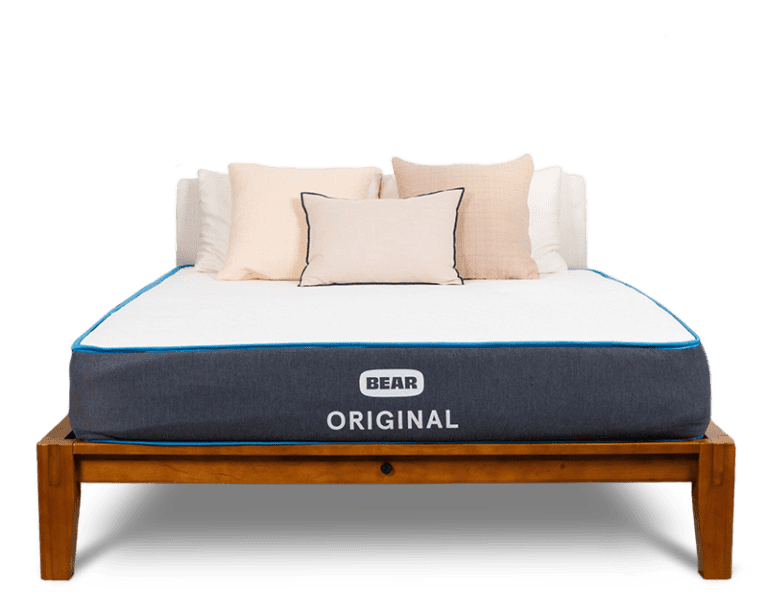
Bear Original
An affordable foam bed designed for those with an active lifestyle.
Key Details
- Who It’s Best For: Side and back sleepers.
- Feel: Firm, but after it’s broken in, sleepers find it to have just the right amount of support and cushioning.
- What It’s Made Of: Three types of foam: gel-infused memory foam, a transitional layer of polyfoam, and a core of high-density foam.
- What We Don’t Like: Might require a separate Celliant (cooling) cover if you sleep hot.
Scoring & Reviews
The following ratings show how suitable this mattress is for different sleeping positions and sleeper weights. These scores are determined by how well the mattress supports and relieves pressure for each sleeper type.
In addition to the hands-on feedback from our team, we conduct a number of quantitative tests in our Test Lab. The below ratings are based on the experience of our testers.
SELECT AN ICON TO VIEW DETAILS:
Motion Isolation
Like many memory foam mattresses, the Bear Original has an above-average ability to isolate motion. Because memory foam reacts only in the area where weight is placed directly upon it, only limited vibrations spread across the mattress surface.Since the Bear Original has a firm (7) feel, its memory foam does not hug the body as much as on some beds. This means that you’ll probably be aware when your bed partner tosses and turns or gets out of bed.
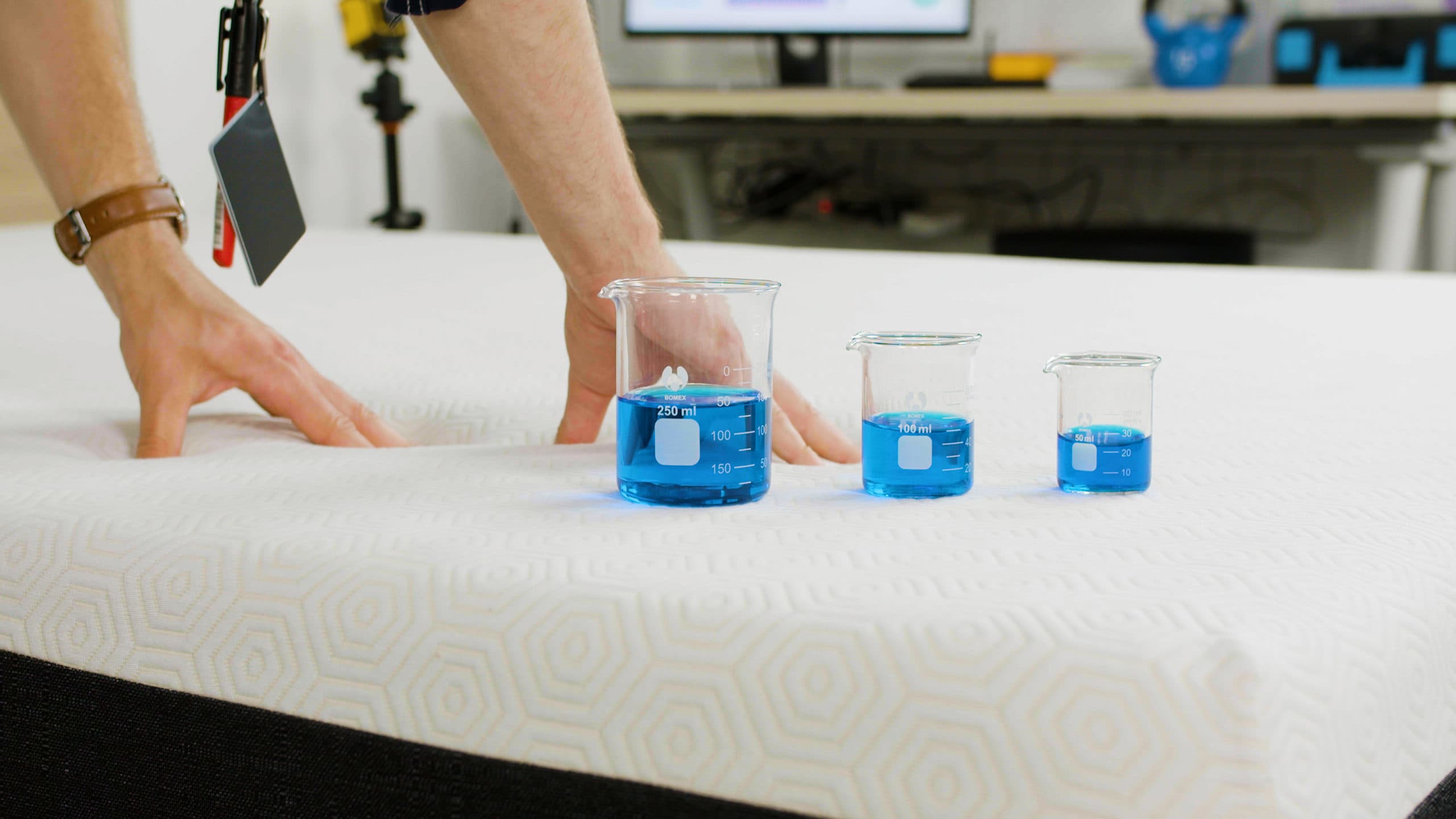
Pressure Relief
The Bear Original scores well for pressure relief. Most of our testers didn’t experience too much pressure buildup. In most cases, the memory foam provided sufficient cradling for their sore spots.However, the Bear Original didn’t get standout scores for pressure relief because the memory foam layer is relatively thin. Some of our testers, especially side sleepers and people with higher body weights, felt the memory foam layer lacked the heft needed to fully cushion their joints.
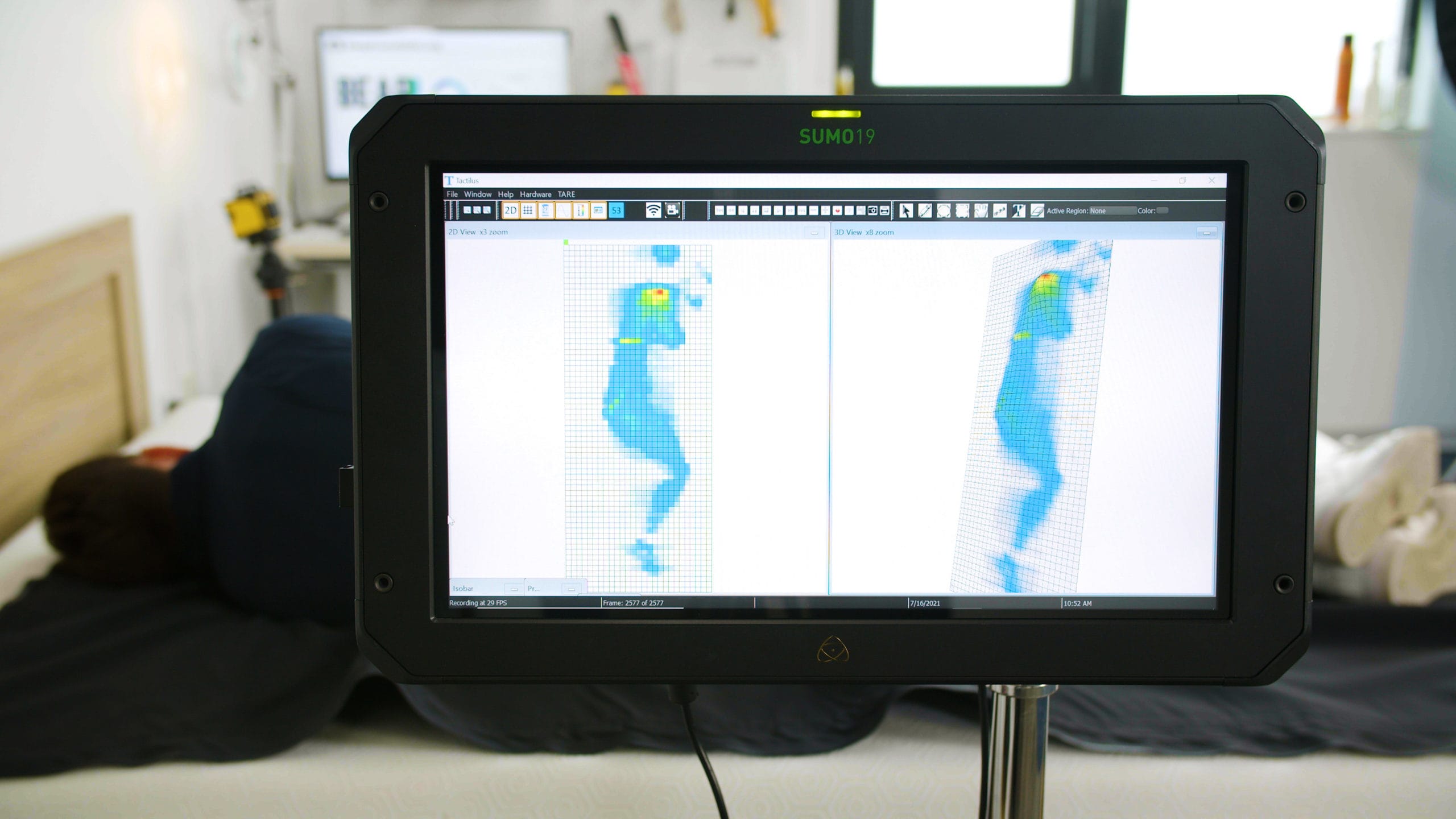
Temperature Control
Memory foam tends to trap heat. This mattress doesn’t hug too closely, but it still contours to the body and can restrict airflow around the skin. The gel-infused memory foam is designed to cut down on heat retention, and the optional Celliant fabric cover is engineered to dissipate heat.For hot sleepers, a memory foam bed may not be the right fit. If you have your mind set on memory foam, the Bear Original’s temperature control is on par with other competing models.
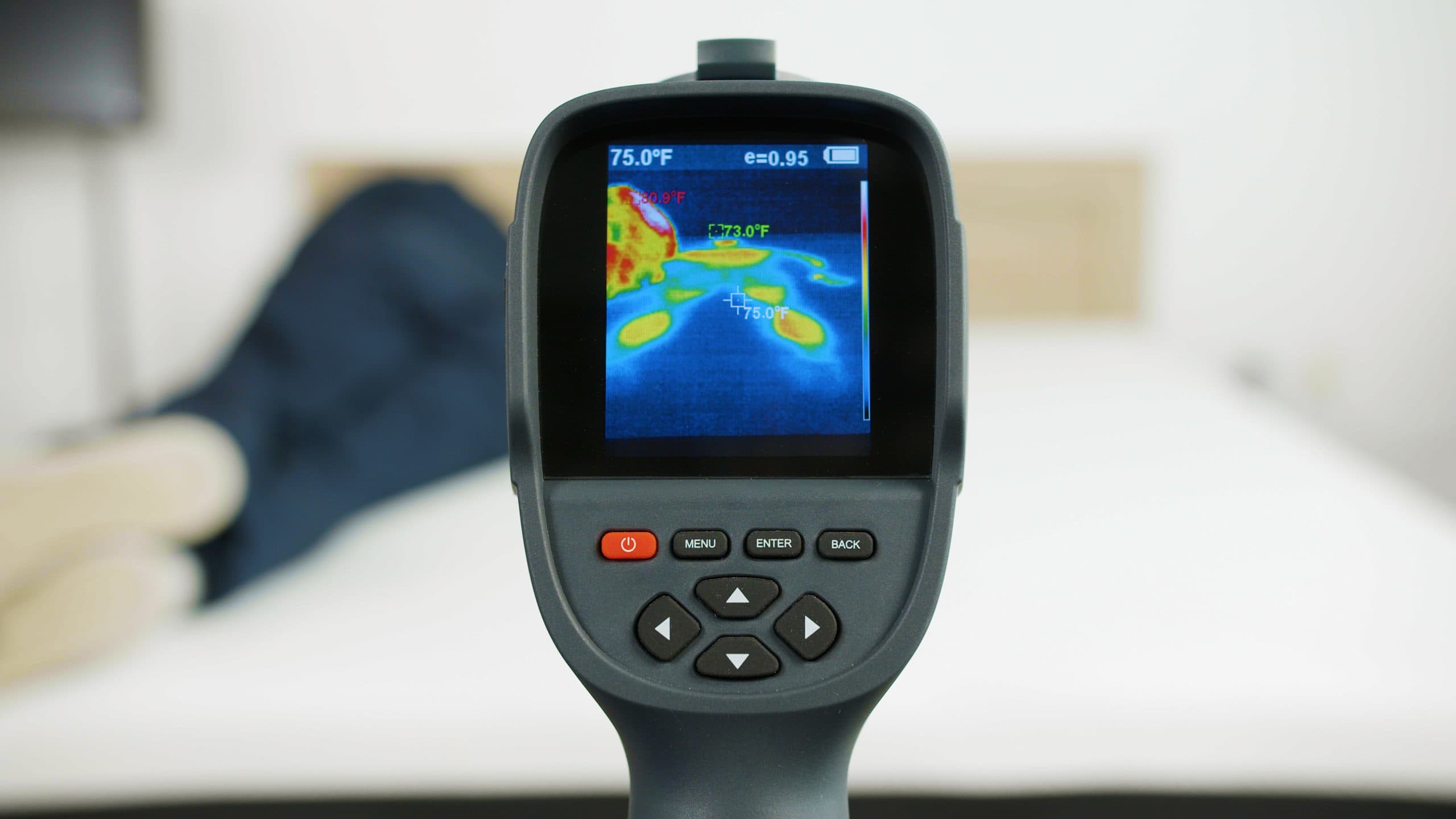
Edge Support
The Bear Original offers limited edge support. We didn’t feel like we were going to roll off the bed, but noticed deeper sinkage around the perimeter. This is a common issue with all-foam models, and can be a problem when you sit or sleep near the edge of the bed.Given its firmness level, the Bear Original has better edge support than many foam models. But for people who want robust edge support, a hybrid or latex mattress may be a better match.
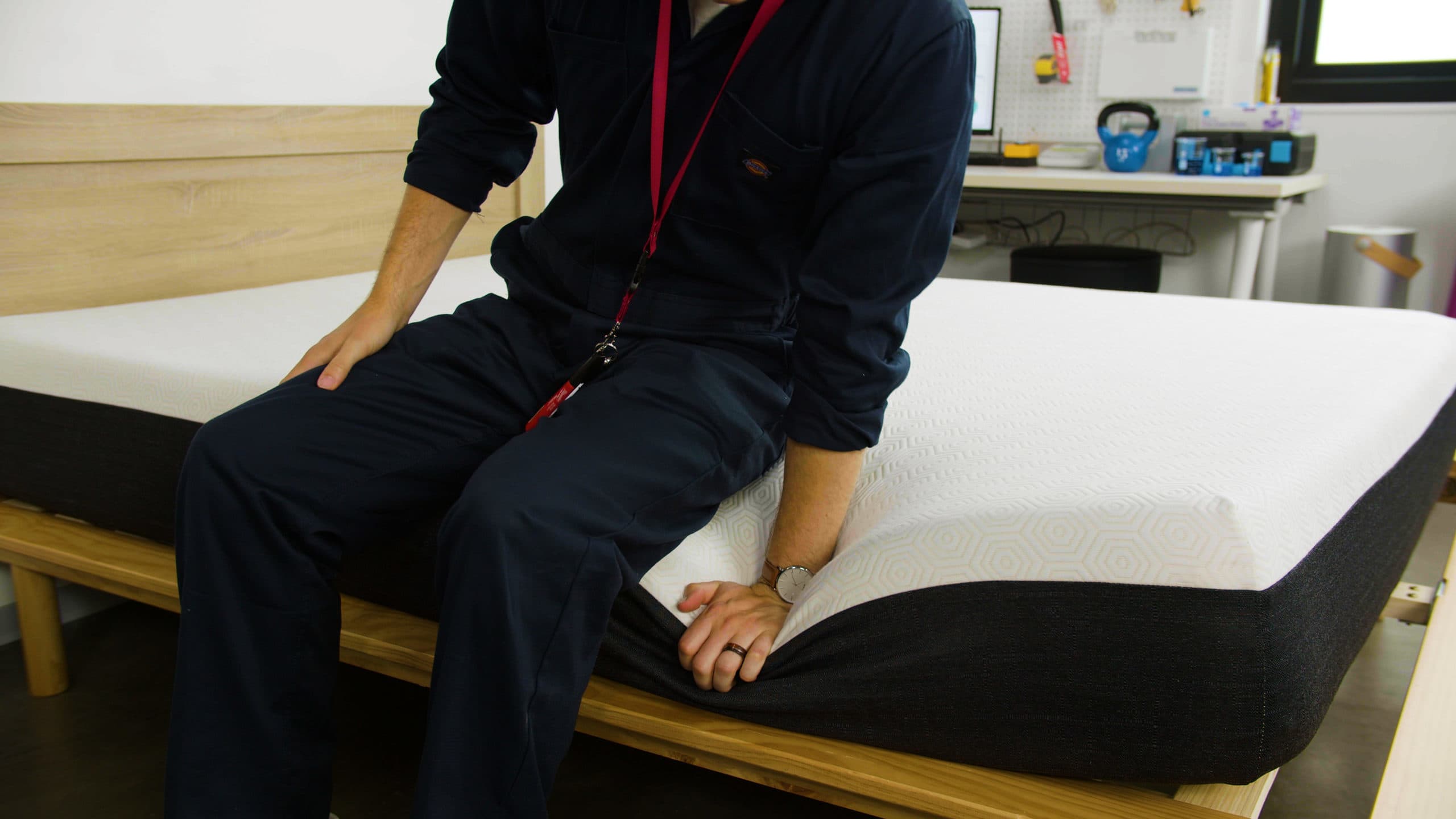
Ease of Movement
The Bear Original is middle-of-the-road for ease of movement. Memory foam tends to hinder movement because it conforms to your body. However, the Bear is firmer than most other foam beds, so it doesn’t seriously impair movement.Without a springy material like latex or coils, there’s nothing to aid your movement on this mattress. As a result, you are likely to encounter at least some resistance. This can be a problem if you frequently change your sleeping position during the night.
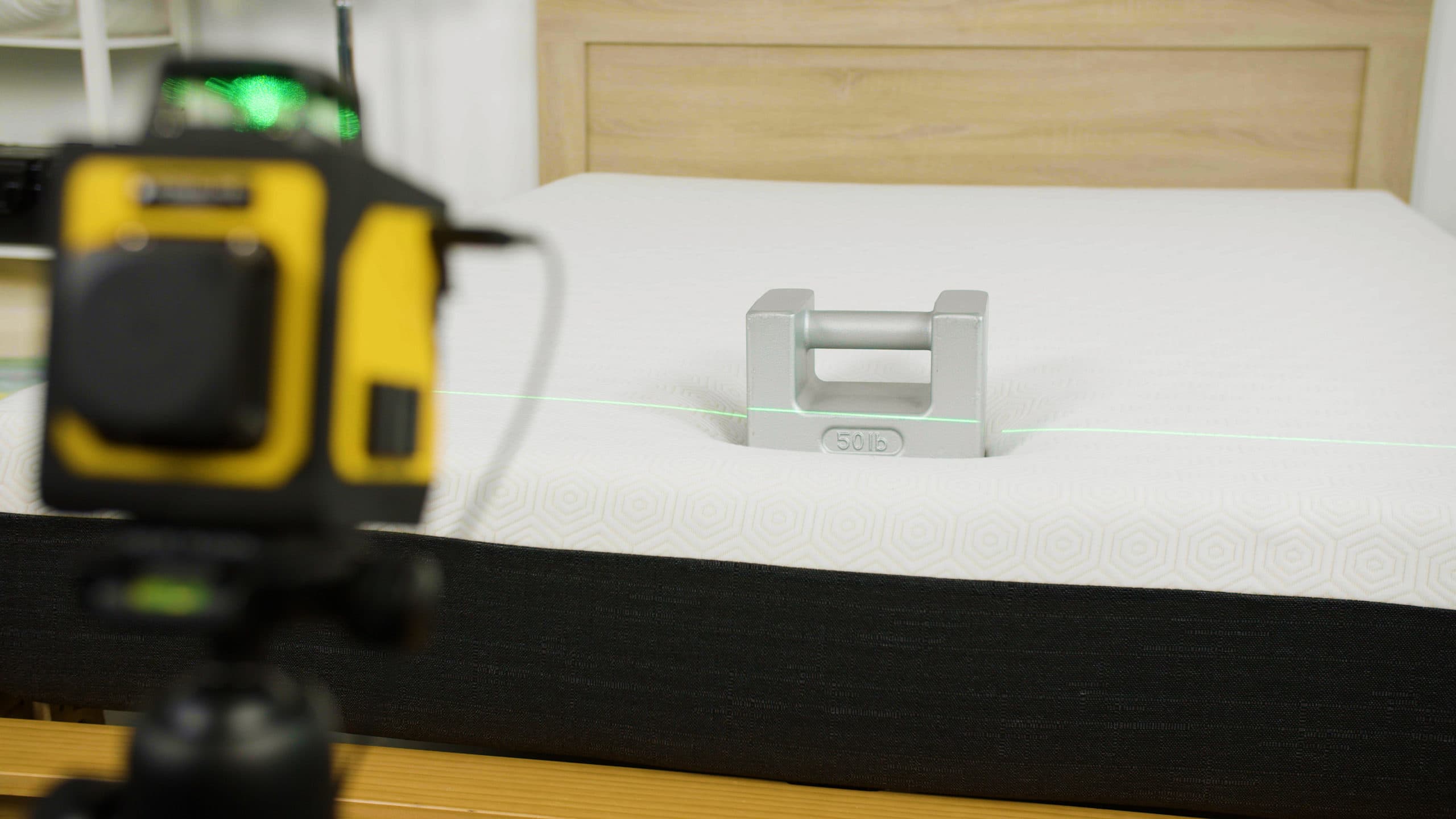
Durability
The Bear Original is an all-foam bed, which inherently lowers its longevity when compared to beds with coil support. On the positive side, the mattress is firm (which typically means a longer life), and the layer of gel memory foam is supported by a stronger polyfoam layer and a high-density polyfoam base. Sleepers should expect to get around six or seven years from this model.
The Bear Original is an all-foam model with a firmer feel than many other competing models you’ll find on the market. The added support combined with moderate contouring makes this a good choice if you enjoy sleeping on foam but also need extra reinforcement.
How It Performs
As with most foam beds, many of our side-sleeping testers found the Bear Original very comfortable — particularly those who weigh over 230 pounds. We noticed the bed offers strong contouring to cushion the shoulders and hips, which are common pain points if you frequently use this position.
The above-average firmness also performed well among our back-sleeping testers who weigh at least 130 pounds. These sleepers require a firm surface to support the lumbar area and padding to cradle the spine.
Our motion isolation tests found the foam layers absorbed motion effectively, which means you’re less likely to wake a sleep partner with movements and rustling at night. If you’re a hot sleeper who tends to overheat on foam beds, you may find this bed comfortable since the cover is made with a breathable Tencel fabric. The foam does not hug your body as closely as softer foam beds, thus trapping less heat.
Best Mattress for Side Sleepers: Nectar Classic
Best Mattress for Side Sleepers
8.7/10Test Lab Score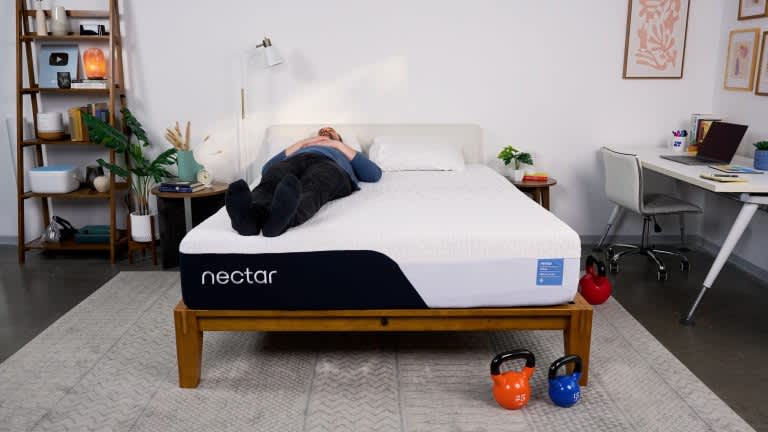
Nectar Classic
A pressure relieving memory foam bed at an amazing value.
Key Details
- Who It’s Best For: Side sleepers and back sleepers under 230 pounds, as well as couples looking for motion isolation.
- Feel: Medium firm (6) but retains the cushy closeness of foam.
- What It’s Made Of: All-foam mattress with a top layer of gel-infused memory foam. The bottom two layers are polyfoam that’s thicker and denser.
- What We Don’t Like: Can retain heat. May be too soft for sleepers over 230 pounds.
Scoring & Reviews
The following ratings show how suitable this mattress is for different sleeping positions and sleeper weights. These scores are determined by how well the mattress supports and relieves pressure for each sleeper type.
In addition to the hands-on feedback from our team, we conduct a number of quantitative tests in our Test Lab. The below ratings are based on the experience of our testers.
SELECT AN ICON TO VIEW DETAILS:
Motion Isolation
Motion isolation is one of the Nectar Classic’s defining strengths. All of the foam layers collectively work together to absorb movement and prevent ripples of motion transfer from spreading elsewhere on the mattress. Couples and co-sleepers should appreciate this quality.
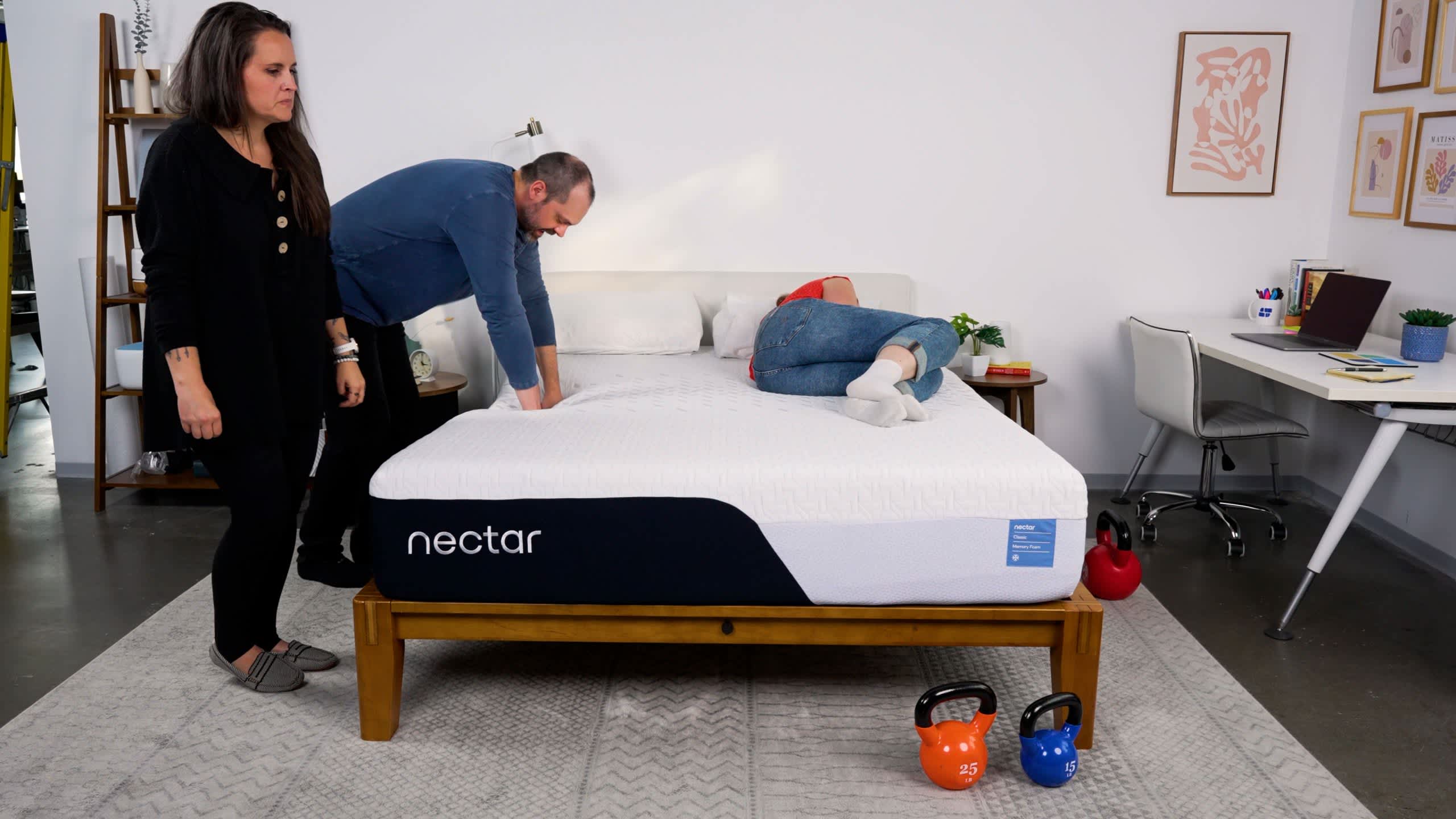
Pressure Relief
The Nectar Classic excels at pressure relief thanks to its design, which features a plush and adaptive memory foam layer on top and dense foam layers in the support system. This creates deep cradling at the surface level to soothe sore spots and pressure zones, but also ensures ample reinforcement to prevent the midsection from sinking too much.
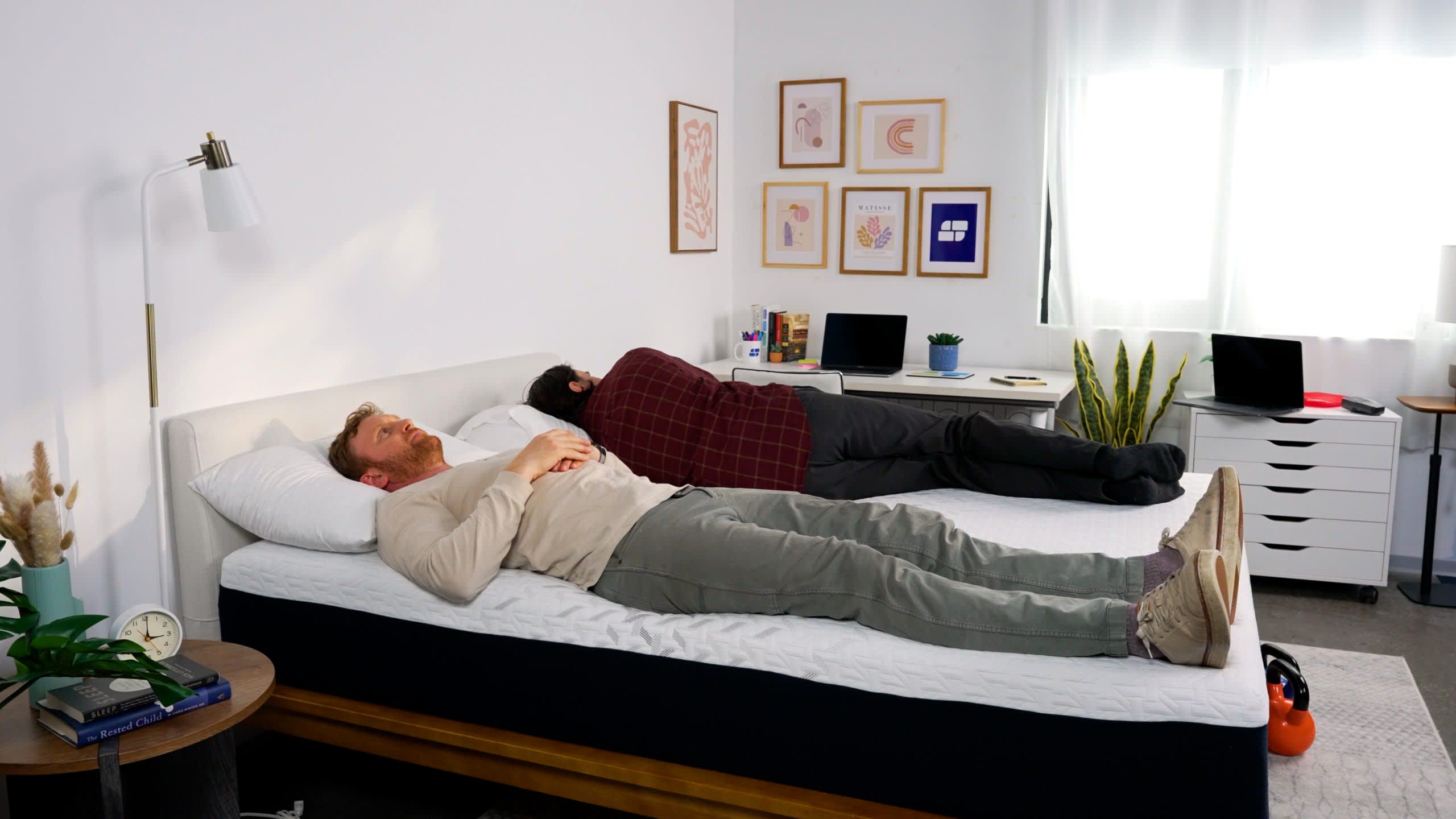
Temperature Control
While the Nectar Classic doesn’t absorb as much heat as many competing memory foam mattresses, sleepers may still notice some warmth on the surface. Cooling components work to offset this. The result is a memory foam model that doesn’t sleep excessively warm, but may still be uncomfortable for people who run very hot in bed.
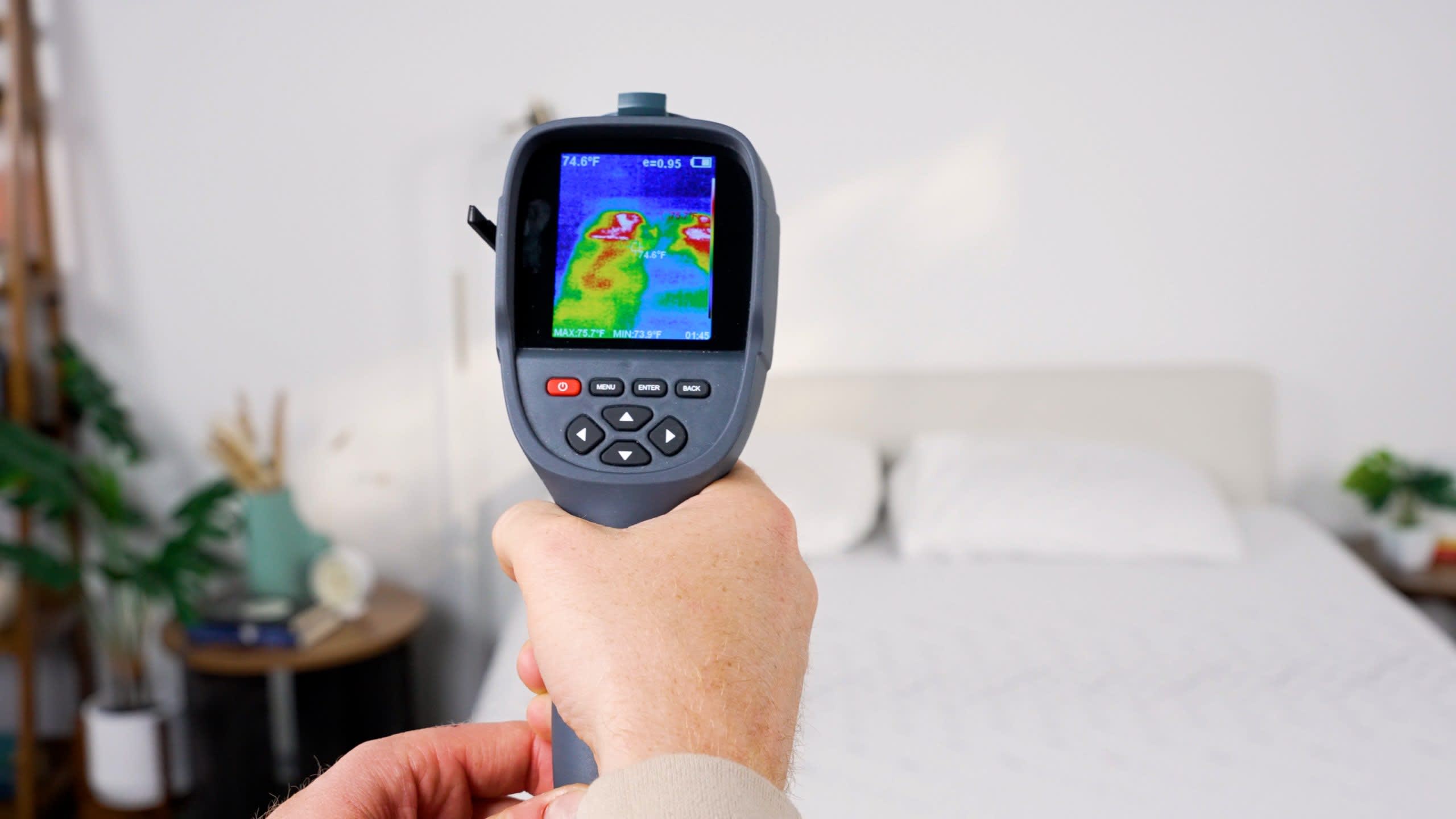
Edge Support
Edge support for the Nectar Classic is so-so at best. While this mattress is firmer than many competing all-foam models, the perimeter is fairly adaptive and still sinks quite a bit when weight is applied. Those seeking maximum edge support should consider a mattress with steel coils in its support core, or possibly an all-foam bed that rates as 8 or higher on the 1-10 firmness scale.
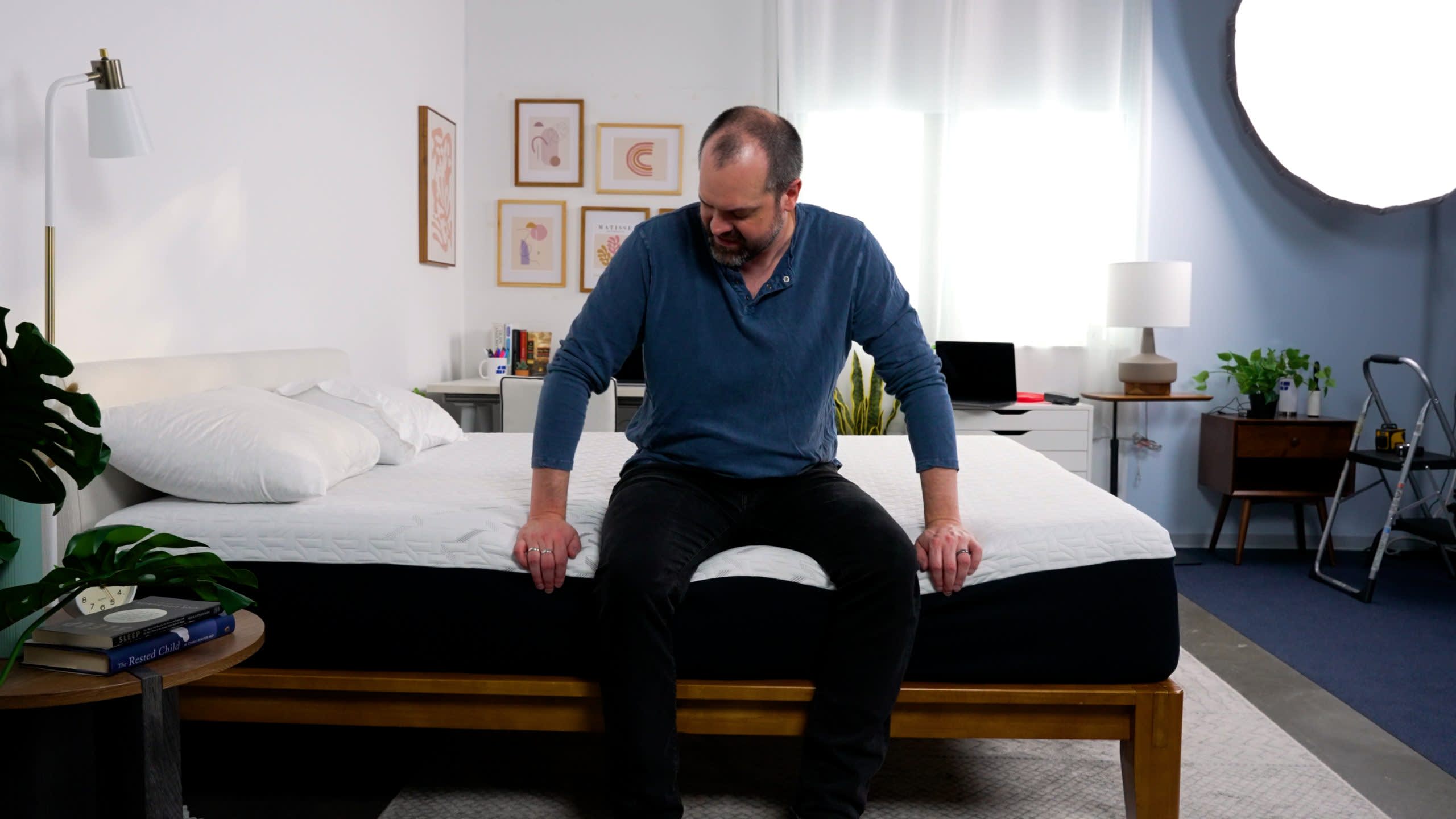
Ease of Movement
The Nectar Classic is firmer than a lot of competing memory foam beds, but most of our team still struggled to move across its surface without feeling “stuck” in the top foam layer. This can make changing sleep positions more difficult if you’re a combination sleeper.
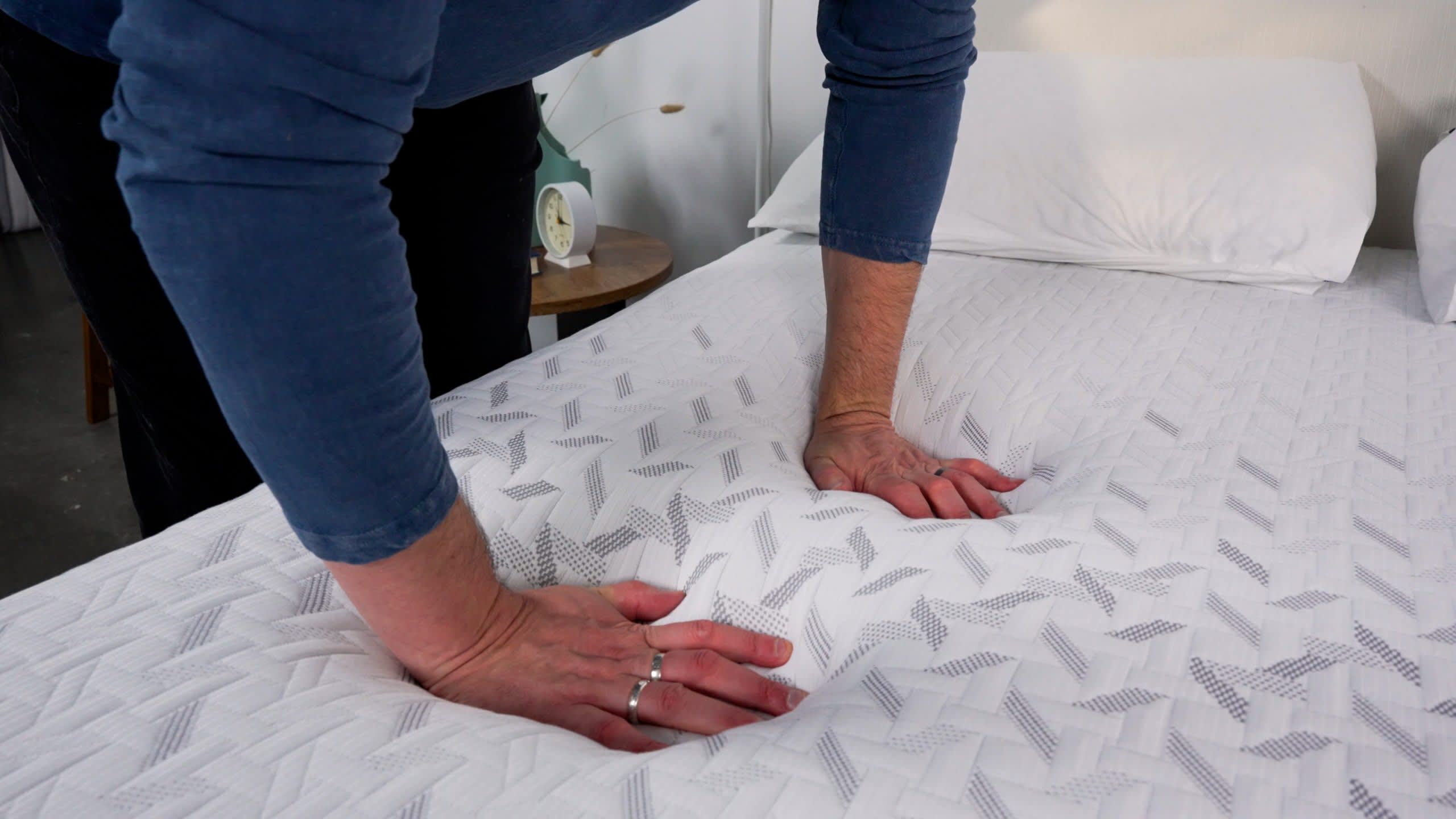
Durability
Like most all-foam mattresses, the Nectar likely won’t last much longer than the average lifespan of seven years or so. This is because memory foam is among the least durable mattress materials and tends to develop impressions and unevenness over the course of several years. That being said, the foam is fairly dense, and the Nectar durability is about average for its type.
The Nectar’s sticker price makes it a high-value mattress compared to other memory foam models. However, our testing found the mattress still performs at the same level as — if not better than — many pricier all-foam beds.
How It Performs
Our in-house testing found the Nectar has a much more balanced feel than many competing foam mattresses thanks to its higher-than-average firmness level.
Side and back sleepers on our team enjoyed the generous cushioning for sore spots in their joints and lower back without sinking excessively. Stomach sleepers weighing less than 130 pounds may also feel comfortable, but those who weigh more will likely need a more supportive mattress.
We also recommend the Nectar for couples who value motion isolation. The foam layers absorbed most movement transfer and noise when we moved across the mattress or changed positions, so you should notice fewer disturbances if your partner tosses and turns at night.
Best Mattress for Combination Sleepers: Leesa Original
Best Mattress for Combination Sleepers
8.2/10Test Lab Score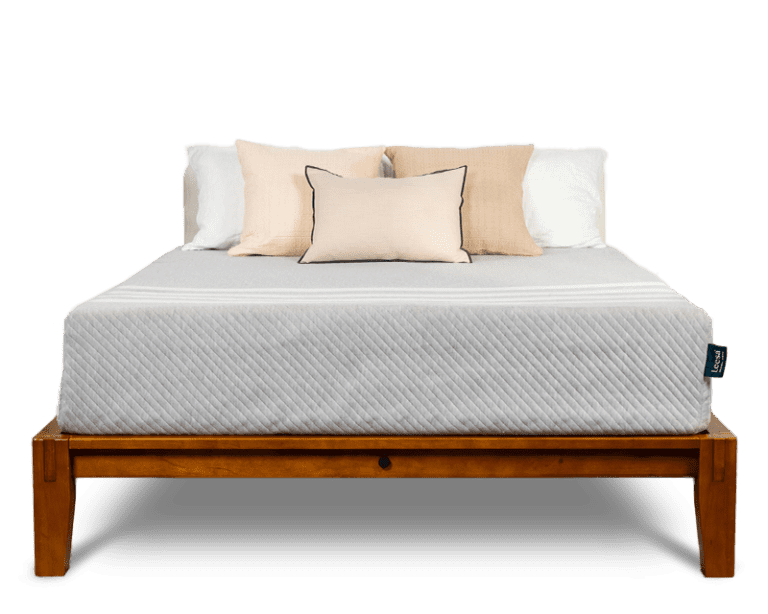
Leesa Original
High-quality all-foam bed that appeals to most sleepers.
Key Details
- Who It’s Best For: Side sleepers up to 230 pounds, couples, and people who usually find foam mattresses too hot.
- Feel: Medium (5) design with close contouring and deep cushioning to promote spinal alignment.
- What It’s Made Of: Comfort layers of adaptive polyfoam and memory foam over a high-density foam base.
- What We Don’t Like: Too soft and prone to excessive sinkage for most back and stomach sleepers
Scoring & Reviews
The following ratings show how suitable this mattress is for different sleeping positions and sleeper weights. These scores are determined by how well the mattress supports and relieves pressure for each sleeper type.
In addition to the hands-on feedback from our team, we conduct a number of quantitative tests in our Test Lab. The below ratings are based on the experience of our testers.
SELECT AN ICON TO VIEW DETAILS:
Motion Isolation
In our testing, the Leesa Mattress earned high marks for motion isolation. The foam layers absorb the vast majority of vibrations, so you barely notice when there’s movement on the other side of the bed. All of our testers thought this would be a good choice for couples.
Pressure Relief
The Leesa Mattress offers solid pressure relief. Its memory foam layer offers essential contouring, but the polyfoam layer above it prevents the hug from feeling overwhelming.As a result, there’s a pleasant balance between support and cushioning that suits many sleepers. That said, people who want a very firm feel or, conversely, a cloud-like hug may be disappointed with this mattress.
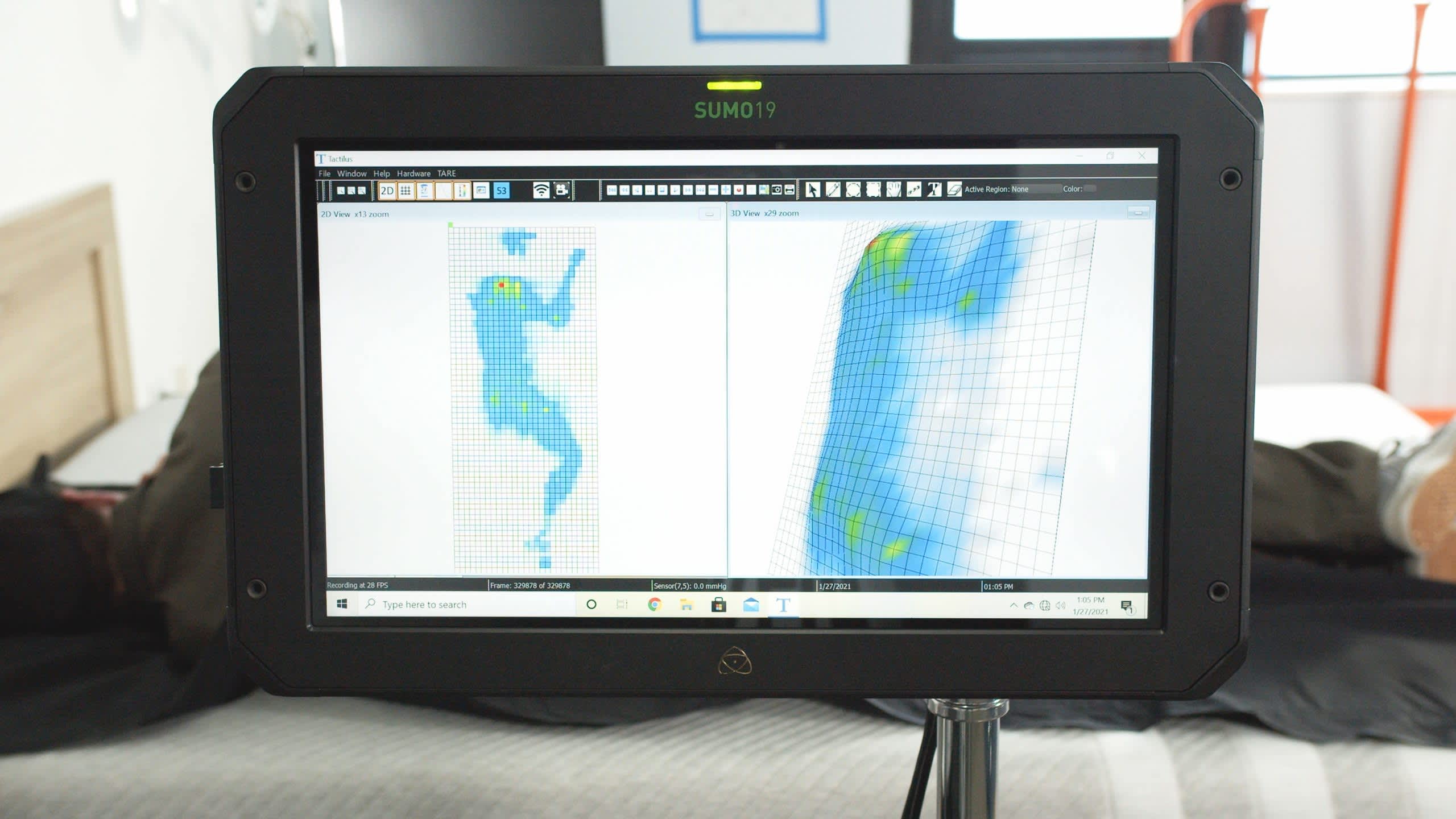
Temperature Control
The Leesa Mattress sleeps cooler than other memory foam models, though as an all-foam bed, it can still run warm.Heat retention is most likely to be a problem for people who already tend to sleep hot. It may also be worse for people who weigh over 230 pounds. These sleepers push further down into the foam, trapping heat around the body.
Edge Support
In our testing, a lack of edge support on the Leesa was a common complaint from our team members. The foam layers are weakest around the perimeter, which can cause noticeable compression when you’re sitting or lying down close to the edge.While this didn’t make the mattress feel unstable, it made it harder to take advantage of the full surface of the mattress. Compression around the edges can also make it more difficult to get in and out of bed.
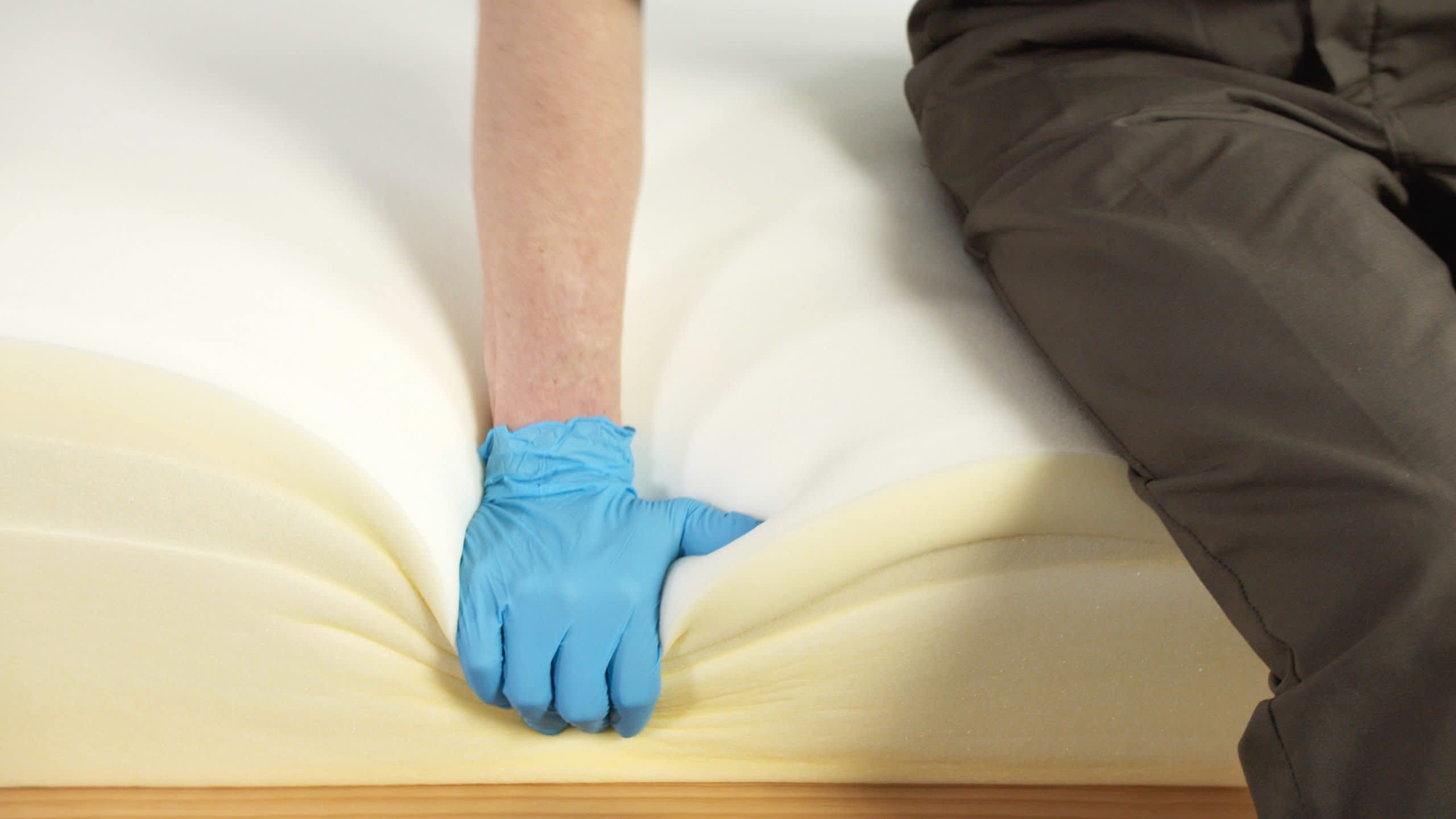
Ease of Movement
The Leesa Mattress isn’t exceedingly bouncy, but it also doesn’t feel like quicksand. In our testing, most people found that the ease of movement was perfectly adequate, and they were able to adjust sleeping positions without significant difficulty.However, the further a person sinks into the bed, the greater the resistance to movement. As a result, it can be much harder for people over 230 pounds to move on the Leesa Mattress.
Durability
The Leesa Original should last six to seven years, which is about average for a foam mattress. Over time, foam wears down, which may lead to permanent body indentations, uneven areas, and sagging. That said, the Leesa Original uses mostly polyfoam, with only two inches of the less-durable memory foam, so we don’t expect it to wear out early.
If you’re mattress shopping for a pre-teen, teen, or young adult, the Leesa Original is a reliable and affordable option. Our testers found the all-foam design combines close contouring with a sturdy support system to help your child sleep comfortably.
How It Performs
During our hands-on tests, the Original proved popular with the side and back sleepers on our team weighing up to 230 pounds. The most favorable ratings came from those under 130 pounds, but testers who weigh 130 to 230 pounds also found the mattress comfortable and didn’t report excessive sinkage around the midsection. The mattress also earned higher-than-average marks from our side sleepers who weigh over 230 pounds.
Like most foam mattresses we’ve tested, the Original performed well for motion isolation. Our testers noticed little to no motion transfer when lying side by side on the mattress, even when the other person changed positions or got out of bed. Our tests also revealed minimal pressure buildup and low heat retention, the latter of which can be attributed to the Original’s open-cell foam layers.
Best Temperature Regulating Mattress: Layla Essential Mattress
Best Temperature Regulating Mattress
7.7/10Test Lab Score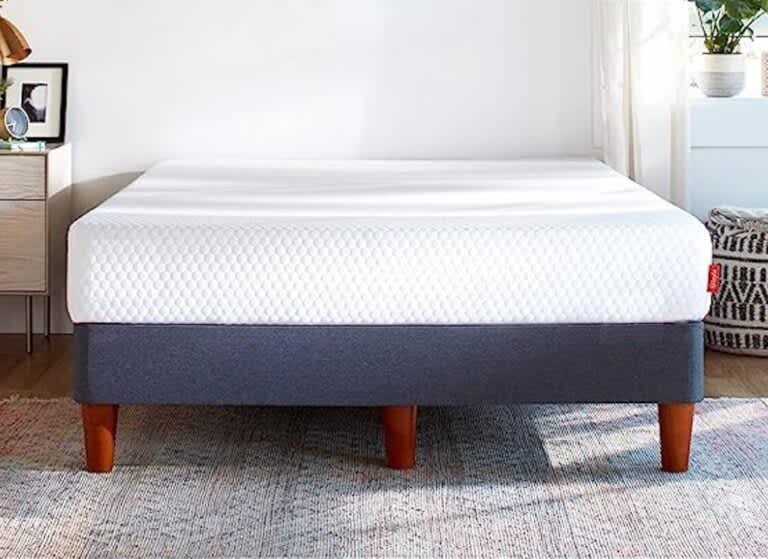
Layla Essential Mattress
A budget-friendly foam mattress that excels at pain and pressure relief.
Key Details
- Who It’s Best For: Side sleepers, couples, hot sleepers, and budget shoppers.
- Feel: Not too firm and not too soft.
- What It’s Made Of: Open-cell memory foam comfort layer and a high-density foam base.
- What We Don’t Like: Not easy to move around in and may be harder for people with mobility issues to get in and out of it.
Scoring & Reviews
The following ratings show how suitable this mattress is for different sleeping positions and sleeper weights. These scores are determined by how well the mattress supports and relieves pressure for each sleeper type.
In addition to the hands-on feedback from our team, we conduct a number of quantitative tests in our Test Lab. The below ratings are based on the experience of our testers.
SELECT AN ICON TO VIEW DETAILS:
Motion Isolation
The Layla Essential’s all-foam construction makes it effective at isolating motion. In particular, the memory foam helps keep vibrations from rippling across the mattress surface when a bed partner rolls over or gets in or out of bed.While the Layla Essential won’t eliminate all motion transfer, it can prevent movement-based sleep disruptions for the majority of couples. And its motion isolation is better than what you get from most other mattresses at this price point.
Pressure Relief
During our pressure relief testing, the Layla Essential received roughly average scores. It doesn’t have the deep contouring that you’ll find in many other memory foam mattresses, which is a result of the relatively thin comfort layer.Although the memory foam can reduce pressure buildup, it may not work as well for people who have a higher body weight or sharper pressure points. We found people under 130 pounds were most likely to give this mattress high marks for pressure relief.
Temperature Control
Mattresses made from foam tend to absorb body heat, and the Layla Essential Mattress isn’t an exception. We found that it performed about average during heat mapping trials, which means it didn’t feel excessively hot or especially cool.Hot sleepers and people living in warm climates may prefer a mattress with more cooling features or a design that more effectively resists heat retention. However, people who don’t tend to sleep too hot should be comfortable on this mattress.
Edge Support
Like most memory foam mattresses, there’s some noticeable compression along the perimeter. For most people, that’s not a problem, but it could be a concern for sleepers with limited mobility and those who frequently sit on the edge of the bed. The foam compression around the edges may also be more significant for people over 230 pounds.
Ease of Movement
Our testers found this bed relatively easy to move around on, especially considering its memory foam comfort system. Memory foam mattresses often inhibit movement and give sleepers the feeling that they’re trapped in the mattress. Some enjoy this “hug,” but moving on the surface can be difficult.The Layla Essential’s surface allows sleepers to move around on the bed without sinking too deeply into the foam. So while it’s not bouncy or springy, it also doesn’t feel like quicksand.
Durability
Foam mattresses typically last less than latex or hybrid mattresses, since foam inevitably starts to break down and lose its pressure-relieving and supportive capabilities. The memory foam used in the Layla Essential has a density of 2.5 pounds per cubic foot, while the polyfoam core has a density of 1.5 pounds per cubic foot. These are considered relatively low-density foams, so they’re more apt to break down prematurely, probably around the five- to six-year mark.
One of Layla Sleep’s newest mattresses, the Essential is a wallet-friendly, all-foam model constructed with balanced comfort in mind. The medium firm (6) feel and gentle contouring should appeal to a wide range of people across different sleep positions and body types. An open-cell top layer also promotes breathability near the surface and helps you stay cool.
How It Performs
The Layla Essential earned favorable ratings from the vast majority of our testing team — a rare feat for a mattress this affordable. Side sleepers between 130 and 230 pounds were particularly impressed, as were back and stomach sleepers below 130 pounds.
Stomach sleepers over 230 pounds were the only testers who assigned negative ratings, complaining of inadequate support and too much sink. If this describes you, we recommend a firmer mattress with a sturdier support system.
Motion isolation was a performance area where the Layla Essential excelled. None of our testers felt any movement when lying side by side on the mattress, and our kettlebell drops resulted in minimal motion transfer.
Our thermal body sensors also detected minimal heat on the surface during temperature control tests, and most of our testers agreed the mattress prevented excessive pressure buildup.
Best Hybrid Mattress: Silk & Snow Hybrid
Best Hybrid Mattress
7.8/10Test Lab Score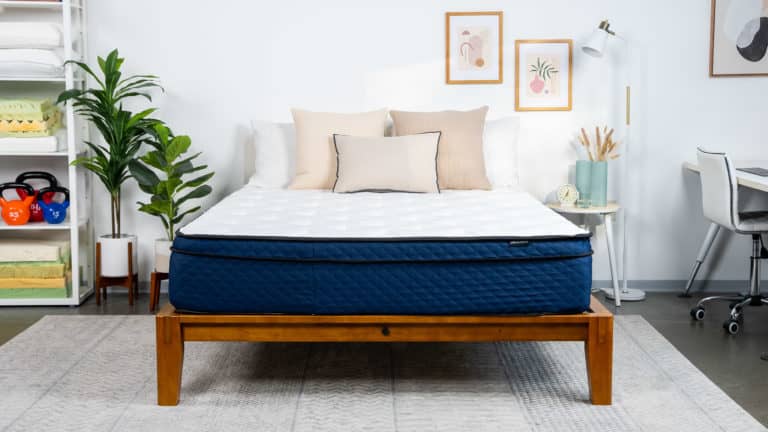
Silk & Snow Hybrid
An affordable hybrid mattress with close-conforming foam layers.
Key Details
- Who It’s Best For: Side sleepers.
- Feel: Balanced feel and comes in medium-firm and plush options.
- What It’s Made Of: A quilted polyfoam layer below an antimicrobial cover, followed by a thicker layer of memory foam. The base is a pocketed coil system and reinforced perimeter, zoned to provide extra support to heavier parts of your body.
- What We Don’t Like: May lack enough support for back and stomach sleepers more than 230 pounds. On the heavier side and may be difficult to move.
Scoring & Reviews
The following ratings show how suitable this mattress is for different sleeping positions and sleeper weights. These scores are determined by how well the mattress supports and relieves pressure for each sleeper type.
In addition to the hands-on feedback from our team, we conduct a number of quantitative tests in our Test Lab. The below ratings are based on the experience of our testers.
SELECT AN ICON TO VIEW DETAILS:
Motion Isolation
The Silk and Snow Hybrid isolates motion to prevent sleep disturbances when your partner switches positions or gets in or out of bed. The mattress performs well in this category because of its contouring foams that isolate vibrations from movement.In particular, the plush model offers standout motion isolation thanks to its two layers of memory foam. However, most couples will sleep soundly on either version of the mattress without being stirred awake when their partner moves.
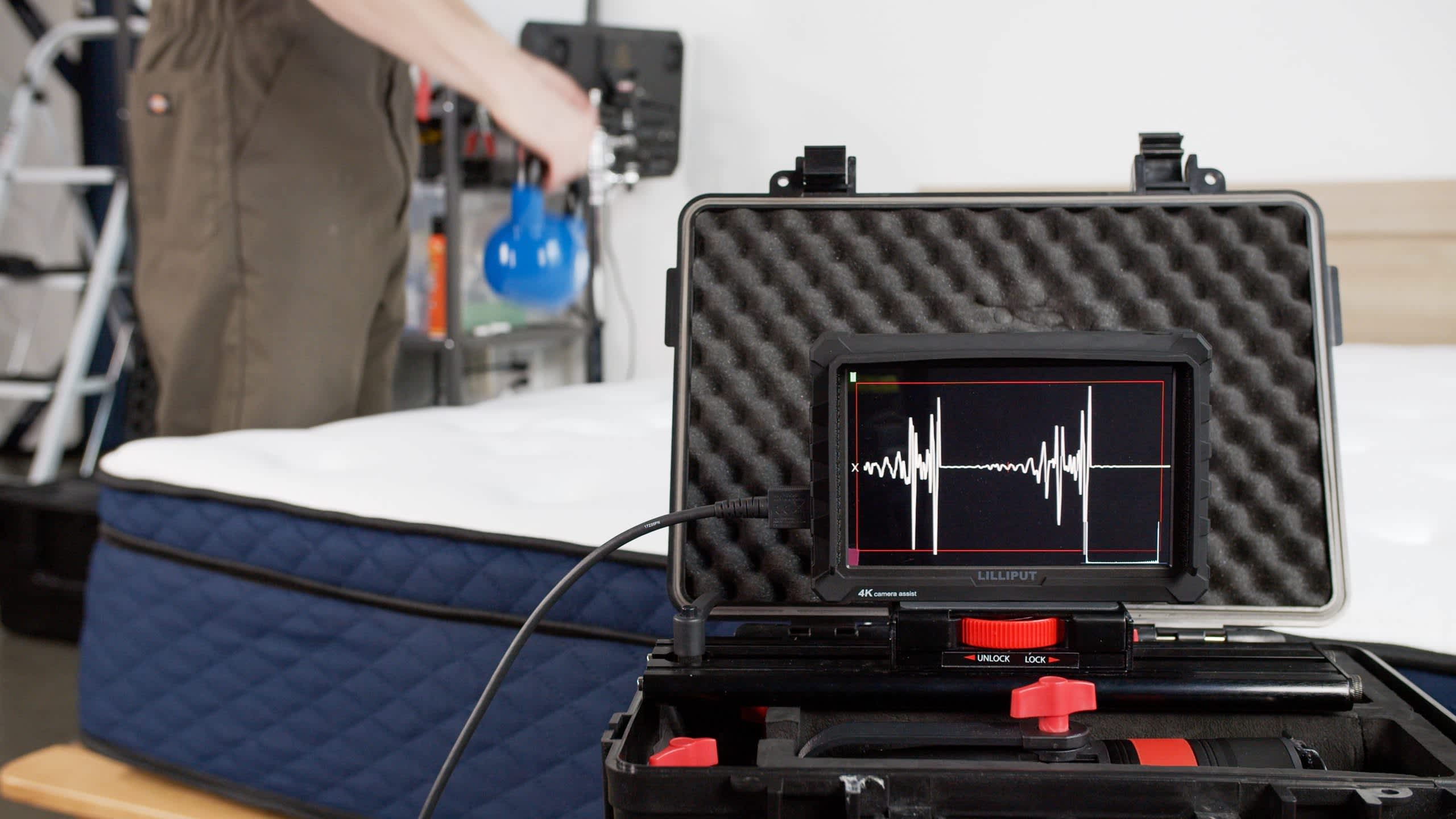
Pressure Relief
In our testing, both firmnesses offered impressive pressure relief, but the plush model had the edge. With two layers of contouring memory foam, it demonstrates a strong ability to cradle heavier parts of the body and avoid pressure buildup. That said, many stomach sleepers may find that these same characteristics are problematic, since they can cause the abdomen to sink in deeply and fall out of line with the rest of the spine.
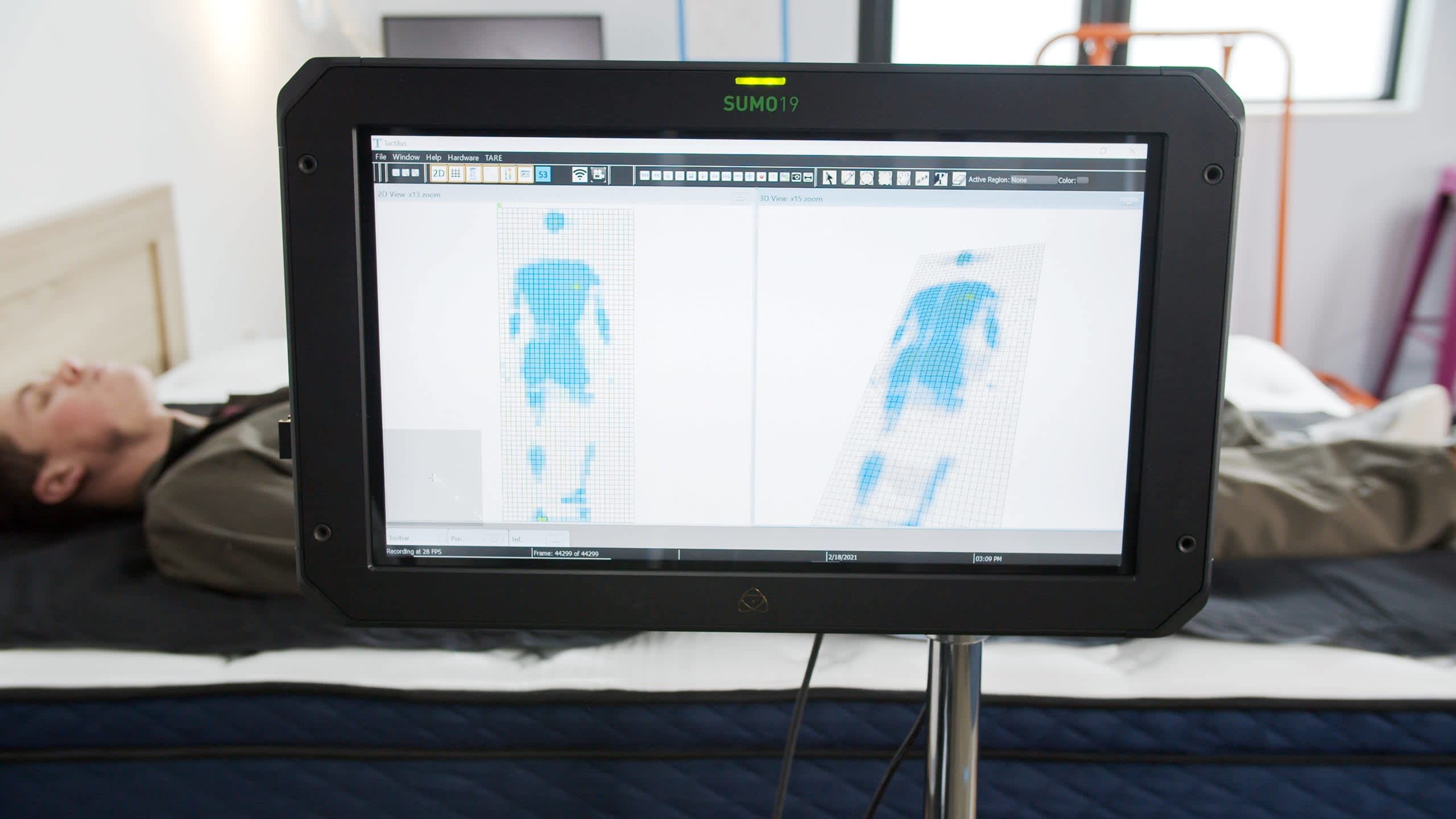
Temperature Control
The Silk & Snow Hybrid offers average temperature control. That said, the medium firm (6) model uses gel-infused foams to counteract heat buildup and the coil support core promotes plenty of interior airflow. The plush model sleeps warmer. It has thicker layers of memory foam, which means more hug and less air circulation.If you’re a hot sleeper, you may overheat on the Silk & Snow Hybrid. If sleeping hot isn’t a problem for you, this mattress shouldn’t cause temperature issues.
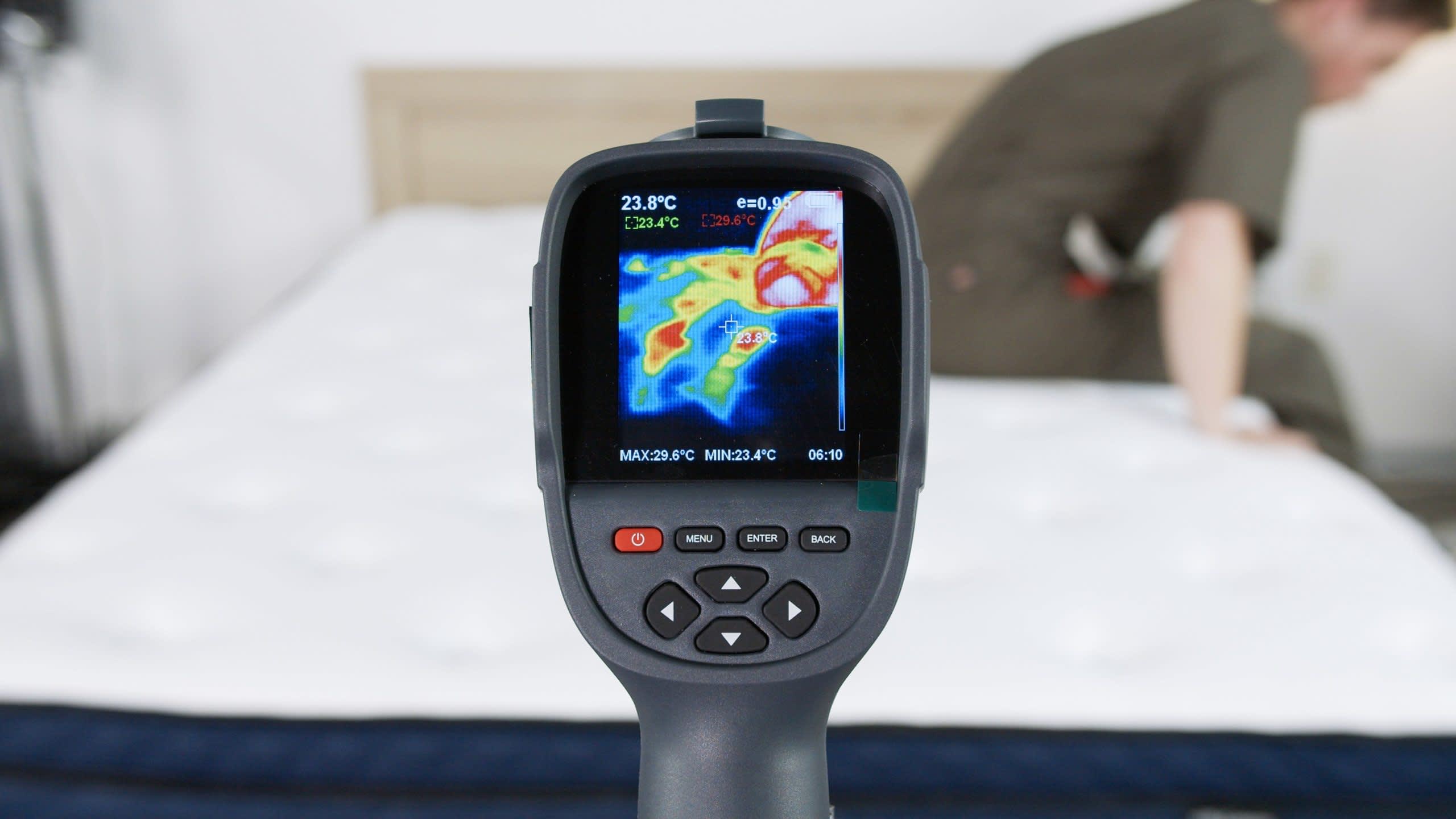
Edge Support
The design of the Silk & Snow Hybrid is intended to improve edge support. In the support core, a thick wall of high-density polyfoam runs along the perimeter, which hedges against excess sinking in the top layers.With this design, the edges of the mattress feel pretty sturdy even though you’ll notice the foam compressing. On the plush model, though, the perimeter is noticeably weaker because of the additional layer of soft memory foam.
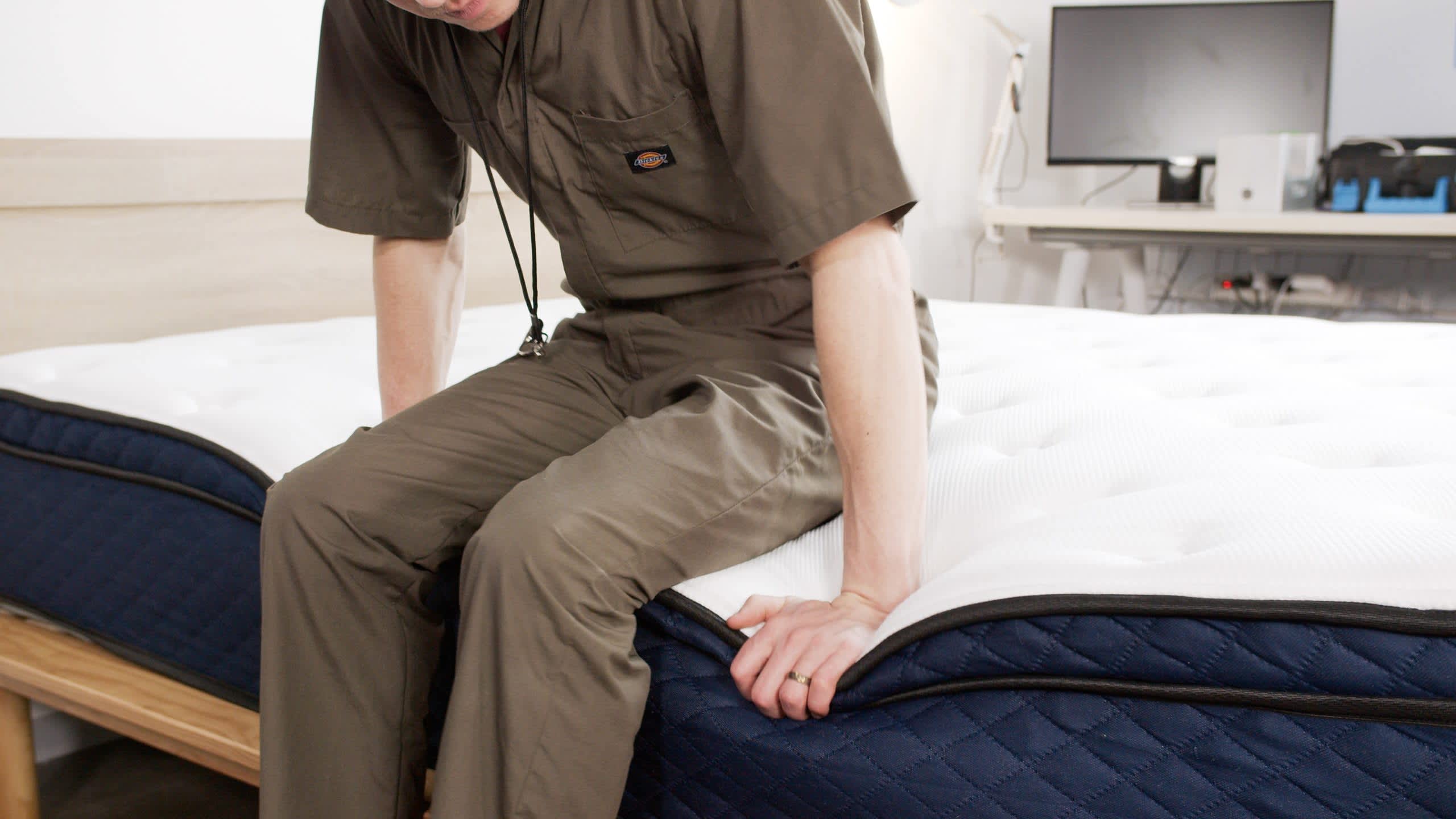
Ease of Movement
While the Silk & Snow Hybrid isn’t the easiest mattress to move around on, it doesn’t pose major barriers to movement, either. Most of the time, memory foam seriously inhibits ease of movement. But on the Silk & Snow Hybrid, our testers found that the coils provided enough bounce to move without resistance.Sleepers over 230 pounds are more likely to encounter difficulties when trying to move on this bed because they will sink more into the contouring foams.
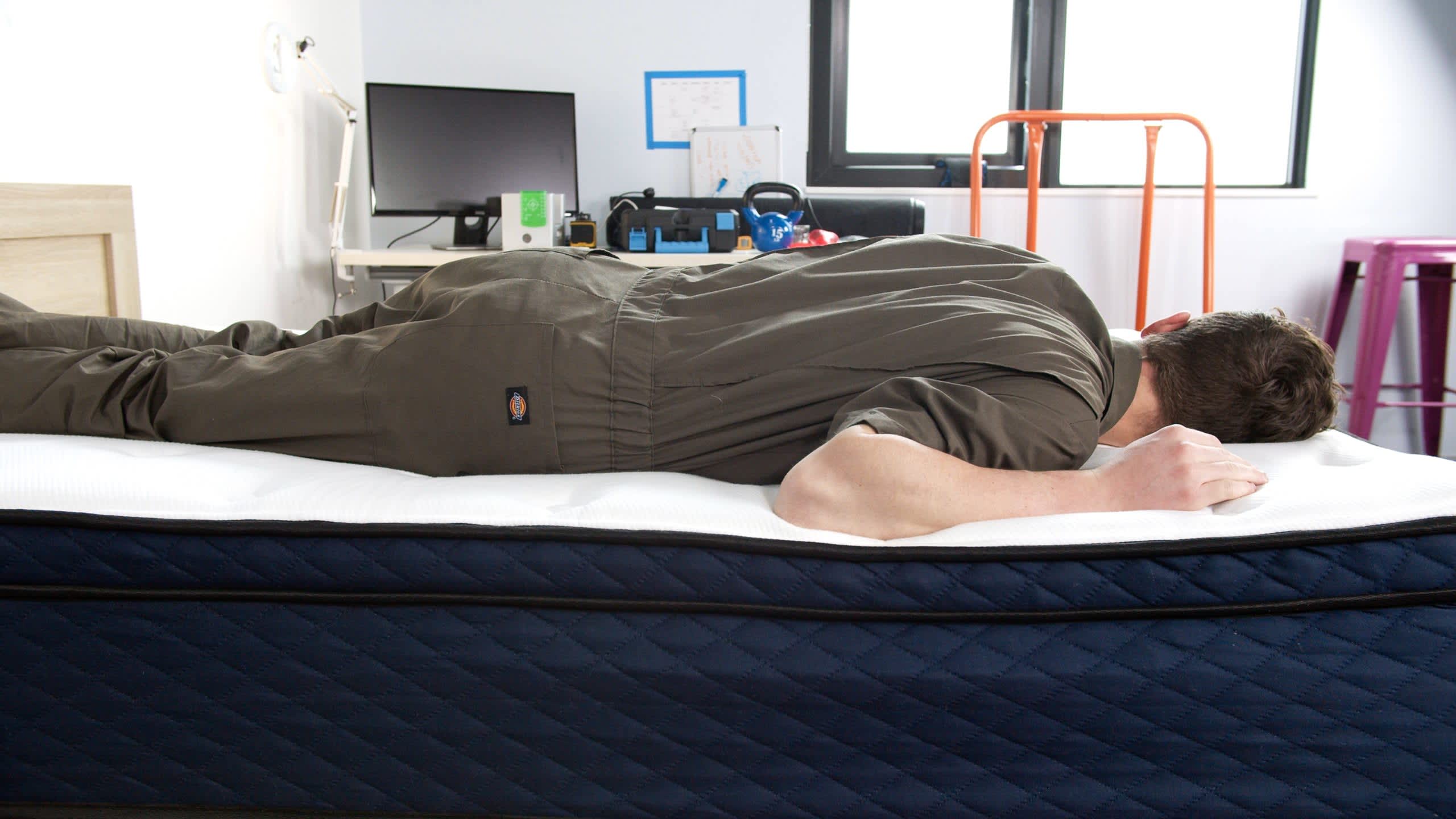
Durability
While the pocketed coils of the Silk & Snow Hybrid should provide long-lasting support, the memory foam in the comfort layer may eventually become uneven. However, it uses high-density memory foam, which will likely resist degradation better than standard types. Overall, this bed should last around seven to eight years, which is about average for hybrids.
The Silk & Snow Hybrid is a medium firm (6) bed sold at a reasonable price-point compared to other hybrid models we’ve tested of similar quality and construction. While the mid-range firmness level performed well across weight categories, our testers who weigh more than 130 pounds greatly benefited from the bed’s excellent support.
How It Performs
Our testing found the foam comfort system and coil support core create a balance of cushioning and support that is well-suited for side sleepers. Our testers who frequently use this position require pressure relief in the shoulders and hips but enough support to prevent excessive sinkage in other areas of the body.
We noticed the coil system ventilated the bed’s interior quite well, and cooling gel infusions in the foam are meant to reduce heat retention, making this an appealing option if you tend to overheat.
Best Organic Mattress: Awara Natural Luxury Hybrid
Best Organic Mattress
8.9/10Test Lab Score
Awara Natural Luxury Hybrid
A budget-friendly latex hybrid with strong support and excellent lasting power.
Key Details
- Who It’s Best For: Back and stomach sleepers who weigh up to 230 pounds, hot sleepers, and shoppers with limited budgets.
- Feel: Medium firm (6) with a dense, responsive comfort system and robust coil support.
- What It’s Made Of: A 2-inch layer of ventilated, organic Dunlop latex over 8-inch pocketed coils. The cover is a rayon blend sewn with wool batting that acts as a natural fire barrier.
- What We Don’t Like: Cushioning is limited, so most side sleepers will find the mattress too firm, and the bouncy surface may produce disruptive motion transfer for couples.
Scoring & Reviews
The following ratings show how suitable this mattress is for different sleeping positions and sleeper weights. These scores are determined by how well the mattress supports and relieves pressure for each sleeper type.
In addition to the hands-on feedback from our team, we conduct a number of quantitative tests in our Test Lab. The below ratings are based on the experience of our testers.
SELECT AN ICON TO VIEW DETAILS:
Motion Isolation
Motion isolation is limited on the Awara, which features responsive latex and coil layers. These materials delivery sturdy support and help you move on the mattress without feeling stuck, but at the same time, you and your partner are likely to notice some motion transfer from the other person’s position changes.
Pressure Relief
Pressure relief is good, but not great. You’ll notice some contouring from the Awara’s latex comfort layer, but it doesn’t mold to the body like memory foam. This may result in minimal pressure relief, especially for side sleepers who need extra cushioning for their shoulders and hips.
Temperature Control
Ventilated latex and wool layers in the comfort system help the Awara Natural Luxury Hybrid stay cool on the surface, while the pocketed coils promote plenty of internal airflow to help the mattress maintain a comfortable interior temperature. This mattress – like many other latex hybrids – is a great choice for hot sleepers.
Edge Support
The Awara Natural Luxury Hybrid contains 8-inch steel coils with extra perimeter reinforcement. As a result, the mattress feels very sturdy along the edges and you shouldn’t notice too much compression when you get in and out of bed.
Ease of Movement
The Awara Natural Luxury Hybrid has a surface that responds to movement with a light bounce. Most people should have little to no trouble moving on the mattress, and shouldn’t feel “stuck” in the bed when changing sleep positions.
Durability
The Awara Natural Luxury Hybrid Mattress uses very durable materials and should last at least nine to 10 years, which is well beyond average. Latex is one of the most durable mattress materials and this hybrid uses Dunlop latex, which is generally longer-lasting than Talalay latex. Also, since it uses thick gauge coils, the support core should hold up equally well.
An affordable organic mattress is hard to come by – in many cases, either the materials aren’t as sustainably sourced as advertised or the manufacturer cuts corners elsewhere. The Awara Natural Luxury Hybrid is an exception to this rule with a design that’s eco-friendly and built to accommodate a wide range of sleeper types.
How It Performs
In our Seattle Test Lab, we observed that Natural Luxury Hybrid is well-equipped to support back and stomach sleepers. Testers who use these positions and weigh up to 230 pounds were particularly impressed with the balanced medium firm (6) construction, which results in light cushioning and steady pushback in response to movement. Some of our side sleepers over 230 pounds also gave high marks to the Awara Natural Luxury Hybrid.
Temperature control is a defining strength of this mattress. A breathable cover sewn with moisture-wicking wool batting, ventilated latex that doesn’t retain too much heat, and open coils that promote ample interior airflow all work together to keep the Natural Luxury Hybrid cool and comfortable. We also gave the mattress high ratings for edge support, as the reinforced perimeter coils are effective at reducing sinkage.
Best Mattress for Couples: DLX Essential
Best Mattress for Couples
7.9/10Test Lab Score
DLX Essential
A supportive foam hybrid that sleeps quite cool.
Key Details
- Who It’s Best For: Side sleepers 230 pounds or more and back and stomach sleepers weighing at least 130 pounds.
- Feel: Two foam layers for cushioning to soothe pressure points and sore spots. On the firmer side and compresses very little.
- What It’s Made Of: Comfort system contains a top layer of viscose fiber batting, followed by two foam layers. Pocketed coils and high-density base foam make up the support core. Cover is made of knit polyester.
- What We Don’t Like: Likely too firm for side sleepers under 230 pounds and anyone who prefers deep contouring. Motion isolation is also limited.
Scoring & Reviews
The following ratings show how suitable this mattress is for different sleeping positions and sleeper weights. These scores are determined by how well the mattress supports and relieves pressure for each sleeper type.
In addition to the hands-on feedback from our team, we conduct a number of quantitative tests in our Test Lab. The below ratings are based on the experience of our testers.
SELECT AN ICON TO VIEW DETAILS:
Motion Isolation
In our testing, the DLX Essential didn’t absorb motion as well as softer foam beds, but that’s expected for a firmer hybrid. We felt some slight movement when our partner shifted positions, especially on the one-sided model. That said, the thick coil system helped minimize excessive bounce, and we think most couples won’t find it overly disruptive.
Pressure Relief
We found the DLX Essential delivered solid pressure relief, particularly for back and stomach sleepers who need firmer support with just a touch of cushioning. Side sleepers over 230 pounds also felt comfortable, though lighter side sleepers might prefer something with deeper contouring.
Temperature Control
The DLX Essential slept noticeably cool during our tests. The viscose fibers quilted into the cover gave the surface a light, breathable feel, and the coil core promoted excellent airflow. We think hot sleepers will be pleased with how effectively this mattress dissipates body heat.
Edge Support
Edge support is one of the standout features of this mattress. When we sat or laid near the edge, the perimeter felt incredibly sturdy — almost no sinkage, even for our heavier testers. This made the surface feel more spacious overall, which is a major perk if you share the bed or tend to sleep near the edge.
Ease of Movement
This mattress was very easy to move on. The firmer feel and bouncy coil support system gave us a lifted sensation, so we never felt stuck. Whether turning over or getting out of bed, transitions were smooth and effortless, a big win for combination sleepers or anyone with limited mobility.
Durability
A cut above most competing hybrid models, the DLX Essential is crafted for a firm, supportive feel with gentle foam padding and robust pocketed coils. This mattress is a great choice for people seeking a strong bounce and maximum reinforcement.
How It Performs
During hands-on tests, most back and stomach sleepers on our team who weigh at least 130 pounds enjoyed the DLX Essential. The coils provide plenty of pushback, so bothersome sinkage around the midsection wasn’t an issue, but the foam layers deliver just enough cushioning to make the surface feel invitingly plush. Side sleepers over 230 pounds also found the Essential comfortable.
Testing areas where the Essential excelled include edge support and ease of movement — both can be attributed to the responsive, coil-based design. We also awarded the mattress high marks for temperature control, as the viscose batting quilted into the cover offered nice cooling bursts on the surface.
Best Cooling Mattress: SweetNight CoolNest
Best Cooling Mattress
8.2/10Test Lab Score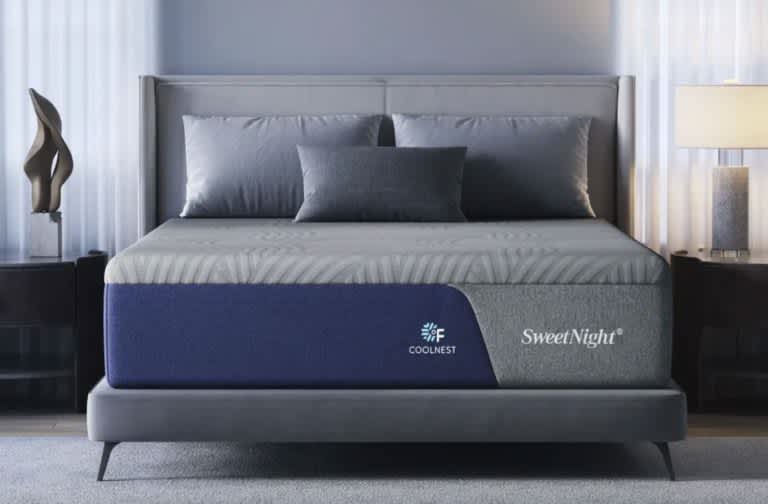
SweetNight CoolNest
A plush, pressure-relieving foam mattress available in three high profiles.
Key Details
- Who It’s Best For: Side and back sleepers up to 230 pounds who enjoy being hugged by their mattress.
- Feel: Medium (5) design with deep contouring on the surface and zoned base support for extra pushback around the midsection.
- What It’s Made Of: A comfort system containing layers of adaptive polyfoam, memory foam, and transitional foam, followed by a base layer of zoned high-density foam.
- What We Don’t Like: Lacks the support and responsiveness needed for most stomach sleepers, and off-gassing odor can be very strong for the first few nights.
Scoring & Reviews
The following ratings show how suitable this mattress is for different sleeping positions and sleeper weights. These scores are determined by how well the mattress supports and relieves pressure for each sleeper type.
In addition to the hands-on feedback from our team, we conduct a number of quantitative tests in our Test Lab. The below ratings are based on the experience of our testers.
SELECT AN ICON TO VIEW DETAILS:
Motion Isolation
All three versions of the SweetNight CoolNest excel at motion isolation thanks to their thick foam layers, which absorb movement and prevent it from tarnsferring to other areas of the mattress. Couples and co-sleepers shouldn’t experience any movement-related sleep disturbances on this mattress.
Pressure Relief
Pressure relief is a defining strength of the SweetNight CoolNest. Thick foam layers evelop your body to create a close, pressure-relieving cradle that promotes even alignment and targets sore spots along your spine. Side sleepers should be especially happy with this mattress.
Temperature Control
You may notice some heat retention on the CoolNest, though the breathable cover and gel-infused foam layers do their part to maintain a comfortable surface temperature. The more you weigh, the deeper you’re likely to sink into the mattress and the hotter you’ll feel as a result.
Edge Support
Edge support is somewhat limited on the CoolNest because the perimeter is not reinforced. People under 130 pounds may not notice too much compression, but heavier individuals will probably have a harder getting in and out of bed.
Ease of Movement
Moving across the CoolNest may be easy or difficult, depending on how much you weigh. Higher weight means deeper compression and more resistance from the foam layers, which some of our testers likened to “feeling stuck” in the mattress.
Durability
Durability is so-so for the CoolNest. Since this mattress is on the softer side, indentations may form in the surface within a few years and the edges may begin to sag over time.
An affordable all-foam mattress that sleeps cool can be a rare find in today’s market, but the SweetNight CoolNest meets all of these criteria. This high-profile model offers deep contouring and multi-zone support, with cooling gel infused in the top memory foam layer to offset heat retention and help you sleep at a comfy temperature.
How It Performs
While the CoolNest is available in three profiles – 12, 14, and 16 inches – our team did not notice any major differences between the three designs and assigned a firmness rating of medium (5) for each one. Side sleepers on our team loved this mattress, especially those weighing up to 230 pounds. Back sleepers under 130 pounds were also impressed with the close contouring and cushioning, while most of our heavier back sleepers and stomach sleepers found the CoolNest lacking in adequate support.
Couples and co-sleepers should appreciate the CoolNest for its superior motion isolation. You’ll likely feel little, if any, motion transfer when your partner changes positions or gets up in the middle of the night – and vice versa. Pressure relief is another defining strength, as the foam layers hug your body in all the right places to help ensure even alignment and reduced soreness along the spine. We also noticed less heat buildup on the CoolNest compared to most competing models in this price range.
Best Mattress for Guest Rooms: Dreamfoam Hybrid
Best Mattress for Guest Rooms
7.6/10Test Lab Score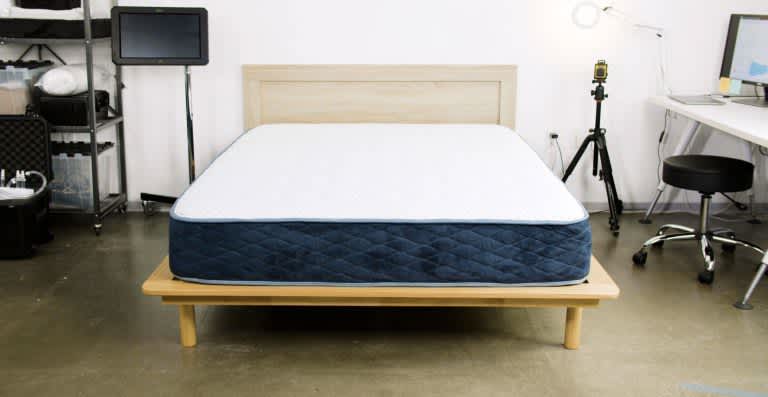
Dreamfoam Hybrid
Ultra-affordable hybrid with multiple firmness and thickness options.
Key Details
- Who It’s Best For: Couples, people who move around a lot, budget-conscious shoppers, and hot sleepers.
- Feel: Responsive yet plush, supportive enough to relieve pressure for side sleepers, and regulates temperature well.
- What It’s Made Of: A quilted cooling cover , followed by a thick layer of gel-infused memory foam, a layer of pocketed coils, and a high-density base foam.
- What We Don’t Like: Not the most motion isolation. Has an initial odor upon unboxing.
Scoring & Reviews
The following ratings show how suitable this mattress is for different sleeping positions and sleeper weights. These scores are determined by how well the mattress supports and relieves pressure for each sleeper type.
In addition to the hands-on feedback from our team, we conduct a number of quantitative tests in our Test Lab. The below ratings are based on the experience of our testers.
SELECT AN ICON TO VIEW DETAILS:
Motion Isolation
The Dreamfoam Hybrid performs surprisingly well when it comes to motion isolation, especially for a hybrid model at this price point. The gel-infused memory foam layer absorbs most movement before it can transfer across the surface, making this mattress a solid choice for couples or co-sleepers who are easily disturbed by motion at night.
Pressure Relief
The thick layer of memory foam delivers strong contouring and pressure relief, especially for side sleepers in the 130–230 pound range. The foam cradles common pressure points like the hips and shoulders, while the coils provide enough support to maintain healthy alignment for most back and stomach sleepers.
Temperature Control
Despite incorporating phase change material and gel-infused foam, the Dreamfoam Hybrid earns below-average marks for temperature regulation. The comfort layers tend to trap some heat, and although airflow through the coils helps to some extent, hot sleepers may find themselves seeking a cooler alternative.
Edge Support
While the Dreamfoam Hybrid doesn’t have reinforced edges, the perimeter still feels reasonably stable thanks to the support of the pocketed coils. Most sleepers should feel secure sitting or sleeping near the edge, but heavier individuals may notice more sinkage when getting in and out of bed.
Ease of Movement
The Dreamfoam Hybrid may feel slightly restrictive for combination sleepers or those who shift positions often. The memory foam creates a close “hug” around the body, which can make it harder to move freely or get out of bed quickly,particularly for those who prefer a bouncier surface.
Durability
The Dreamfoam Hybrid offers a balanced design at a lower price than many of the other hybrids we’ve tested in our lab. The phase change material (PCM) in the cooling panel really sets this model apart, since few hybrids come with PCM covers in this price range.
How It Performs
With a medium firm (6) feel, the mattress offers an even balance of cushioning and sturdy support. The adaptive foam layers gently cradle your body, while the coils generate enough pushback to prevent your midsection from sinking.
During our tests, the mattress earned excellent ratings from side sleepers weighing between 130 and 230 pounds. It was also fairly comfortable for many back sleepers, as well as stomach sleepers up to 230 pounds.
A standout feature of the Dreamfoam Hybrid was cooling. The mattress features a cooling panel made with phase change material, which we don’t find often in models at this price-point. In addition, air circulates freely through the coil system and cooling gel is infused into the foam to prevent excessive heat buildup.
Best Mattress for Teens: Siena Memory Foam Mattress
Best Mattress for Teens
7.5/10Test Lab Score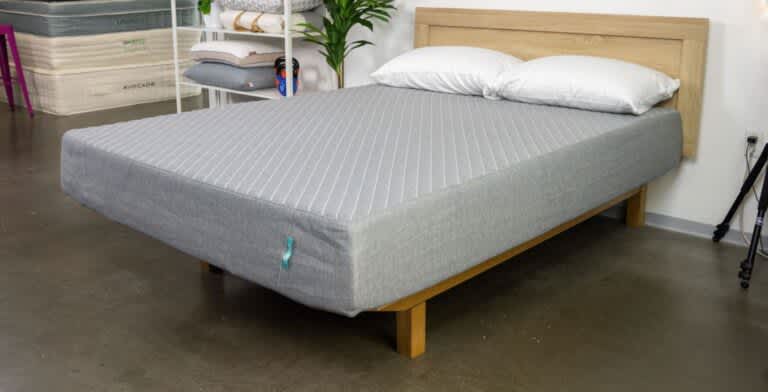
Siena Memory Foam Mattress
An affordable memory foam mattress ideal for kids and guest rooms.
Key Details
- Who It’s Best For: Side sleepers 130 to 230 pounds and back and stomach sleepers under 130 pounds.
- Feel: Responsive yet plush, supportive enough to relieve pressure for side sleepers, and regulates temperature well.
- What It’s Made Of: A soft cover on top of a 2-inch layer of gel-infused memory foam. Beneath that is 4 inches of cushioning foam and 4 inches of foundational, high-density support form.
- What We Don’t Like: Initial odors can be strong. Tends to sleep hotter than similar mattresses.
Scoring & Reviews
The following ratings show how suitable this mattress is for different sleeping positions and sleeper weights. These scores are determined by how well the mattress supports and relieves pressure for each sleeper type.
In addition to the hands-on feedback from our team, we conduct a number of quantitative tests in our Test Lab. The below ratings are based on the experience of our testers.
SELECT AN ICON TO VIEW DETAILS:
Motion Isolation
Our testing found that the Siena Memory Foam Mattress lets you sleep soundly, even if there’s movement on the other side of the mattress.Although the motion isolation isn’t perfect, the top layer of memory foam contains most vibrations. This makes the Siena effective for people who share the bed.
Pressure Relief
The 2-inch layer of memory foam in the Siena Mattress contours to the body, cushioning the heaviest areas. This helps relieve pressure, including around the hips and shoulders.That said, sleepers over 230 pounds may find that the foam is too soft or too thin to properly cushion their body. Pressure relief from this mattress is also limited for back and stomach sleepers.
Temperature Control
Our testers found that heat retention was a serious issue on the Siena Memory Foam Mattress. Even though it’s infused with gel beads, the memory foam collects heat. Its close contouring reduces airflow over the skin, making it harder for your body to cool itself down.While this may not be an issue for people who run cold, it makes the Siena Mattress a poor fit for those who sleep hot.
Edge Support
The Siena Memory Foam Mattress offers average or just below-average edge support. You can feel the foam sink deeply around the perimeter, but it doesn’t completely give out beneath you.Based on our testing team’s experience, the level of edge support is comparable to other low-cost memory foam mattresses. It may be a concern if you frequently sit on the edge of the bed, but it’s not a dealbreaker for most people.
Ease of Movement
Changing sleeping positions can be tricky on the Siena Memory Foam Mattress. There’s almost no bounce, and the conforming foam can create a barrier to movement.For some sleepers, this is a worthwhile tradeoff in order to get the pressure relief of memory foam. But restricted movement may be an issue for combination sleepers and anyone with strength or mobility issues.
Durability
While the Siena Memory Foam mattress excels for affordability and pressure relief, it’s not likely to last much beyond six years because of its construction. It’s all foam, meaning there are no coils to offer sturdy base support. The polyfoam in both the comfort layer and support core help add a bit more stability to the gel-infused memory foam.
The Siena Memory Foam Mattress is a safe bet for most teens. This medium firm (6), all-foam model gently contours to your body but shouldn’t sink excessively if you weigh up to 230 pounds. Our testing results also show the mattress isolates motion, alleviates pressure, and feels reasonably stable along the perimeter.
How It Performs
Throughout our tests, the Siena performed well in areas where memory foam mattresses tend to fall short. The medium firm feel and mid-range profile give the mattress above-average support, so the testers on our team who weigh up to 230 pounds didn’t sink too much as they might on a softer, thicker all-foam model. The Siena also excelled during our motion isolation tests, and very few of our testers experienced painful pressure buildup while lying on the mattress.
Among our different types of testers, the Siena was most comfortable for side sleepers weighing 130 to 230 pounds and back and stomach sleepers under 130 pounds. However, testers across most weight and position groups gave the mattress a rating of “good” or better.
Watch Video: We Tested the Best Affordable Mattresses – Here Are Our Favorites
Watch our video below to learn more about our lab’s top picks for cheap mattress.

How Much Should You Spend on a Mattress?
The average queen size mattress costs about $1,000 to $2,000, but I’ve tried plenty of high-quality options that are $500 or less. Materials, labor costs, and construction type all affect price — and so can where you buy your mattress. Online sellers sometimes have better deals than brick-and-mortar stores, and they’re more likely to run seasonal deals and price cuts.
I don’t have a one-size-fits-all budgets answer, but what can I tell you is this: Start with a price range between what you’d ideally like to spend and the absolute max you can spend. From there, look for models that work for your body weight and sleeping position — and don’t forget to shop sales!
What to Look for in an Affordable Mattress
Whether your budget is $200 or $2,000, there are a few basic factors I recommend all shoppers consider when mattress shopping.
Mattress Type
You can usually save a significant amount of money by choosing a bed with a straightforward design. All-foam beds are typically the cheapest, with most queens costing between $700 and $1,200. Hybrids usually contain a wider variety of materials and have more complex designs, so they range from $1,500 to $2,200. And any kind of bed with extra features like an airbed or adjustable bed will probably cost at least $2,500.
Firmness and Support
In our lab, we measure firmness on a 10-point scale. Low numbers are soft, while high numbers are firm. Our team members (and most people) usually prefer beds between 3 (soft) at the low end and 8 (firm) at the high end. Your weight and sleeping position play a big role in which firmness strikes the right balance of comfort and support.
Softer mattresses rise and fall with your body’s shape and contour alongside it, which we’ve found works best for lighter people and side sleepers who like a cushiony feel. Stomach sleepers and people above 230 pounds usually like a bed on the firm side because it doesn’t let their spines curve or give them the feeling that they’re getting swallowed by their bed.
Back sleepers and people between 130 and 230 pounds are the Goldilocks crew — we want something that’s not too firm and not too soft — so mid-range firmness beds usually work best.
Durability
Over our years of testing, we’ve found that price doesn’t always reflect durability. Just because a mattress is expensive, it doesn’t mean it’s durable. The opposite is also true: Affordable mattresses can be just as long-lasting as pricier options.
The key to finding a durable mattress is to look for high-quality materials and good craftsmanship. High-density foam, natural latex, and thick gauge coils tend to hold up well and resist sagging.
At home, I use a mattress protector to safeguard my bed against wear and tear. I also periodically rotate my bed 180 degrees to switch up where my body weight rests. Rotating isn’t a good option for beds with zoned support systems, but it works surprisingly well for mattresses that are the same firmness top to bottom.
Additional Features
Mattress companies are exceptionally good at catching your eye with marketing tactics that convince you extra features are worth paying a little more for. Lots of mattress bells and whistles really do work as intended, but if you don’t need them, skipping add-on features can help you cut costs. Think about whether these qualities are important enough to pay extra for.
- A flippable mattress with different firmnesses on each side
- Zoned support that has separate levels of pushback for your midsection
- Cooling technology like wicking fibers, gel infusions, or phase-change material
- Firmness levels that change on demand
- Adjustable bed frames that let you sleep at different angles
Make sure you don’t lose sight of what’s going to keep you comfortable long-term. While I don’t think you should blow your budget, saving a few bucks probably isn’t going to be worth it if you have to sacrifice comfort or support to do it.
It may cost more up front to buy a bed with high-quality materials, but it’ll probably last longer than those made cheaply. Like with a lot of other major purchases, spending a bit more at first may save you money over time. After all, you don’t want to have to buy another new mattress in a year or two because this one didn’t hold up.
Mattress Shopping Tips for Budget-Conscious Shoppers
I’ve done a lot of mattress research over the years, here are some of my most tried-and-true methods for finding the best deals.
Look for Sales, Discounts, and Bundle Deals
If you’re willing to be patient, you can get great discounts by waiting for a holiday sale. Tons of mattress companies drop prices around Presidents’ Day, Memorial Day, 4th of July, Labor Day, and Veterans Day. Cyber Monday and Black Friday are usually good bets, too.
I’ve also had good luck buying from companies that offer bundles. If you’re in the market for more than a mattress, look for deals that combine mattresses with pillows, bedding, protectors, frames, or other accessories.
Do Your Research
Even though it can be a little time consuming, it’s worth it to shop around and research. Once you have the main idea of what kind of mattress you want, check out different brands to see how similar beds compare to each other price-wise.
If you want to research beds the easy way, take a look at our testing results. The team and I have spent thousands of hours testing and researching beds for our mattress reviews, so you can always read our guides if you want to see how mattresses stack up against each other.
Take Advantage of Sleep Trials and Warranties
Online brands know that customers are a little wary of committing to such a big purchase without touching their mattress, let alone sleeping on it. To ease worries, most companies offer sleep trials that let you use the mattress risk-free for at least 30 nights — sometimes up to a year! Take advantage of these trials, especially if you’re unsure about your choice.
A good warranty also makes a difference. Some brands cover sagging and indentations by either fixing your bed or replacing it entirely. I think it’s worth it to read the fine print.
Common Concerns with Cheap Mattresses
Foam is made from chemical compounds that aren’t harmful when regulated and made by trustworthy companies, but there are lots of sellers online that don’t care about the quality of their product or the health of their customers. I’ve encountered mattresses with low-quality materials that were irritating to my skin and lungs even when just using them short-term.
All beds in the U.S. must be flame-retardant. Companies looking to cut corners might use chemicals that reputable brands won’t, like formaldehyde, toluene, or polybrominated diphenyl ethers (PBDEs). Long-term exposure to some of these chemicals can cause developmental issues, reproductive problems, or cancer. Some cheap beds have also been recalled because they contain fiberglass.
A good way to make sure you’re getting a quality product, even when it’s cheap, is by looking for mattresses with third-party certifications like CertiPUR-US, OEKO-TEX, or GREENGUARD. They’re outside institutions that don’t have any relation to the mattress companies themselves, so you can be sure that they’re evaluating products truthfully.
How We Test: Rigor, Data, and Sleeper Feedback
Our industry-leading product testing team cares deeply about improving your sleep. Having a holistic understanding of a mattress’s role as part of a sleep system is paramount to our testing process. Since a bed’s comfort and feel depend largely on body weight and sleeping position, our testing team represents a wide range of body types, sleep positions, and comfort preferences.
In our Seattle-based Test Lab, we use an objective, hands-on process to evaluate mattresses across performance categories. The following are the key guidelines that inform our performance ratings. Our ultimate goal is to ensure you have all the information you need to make the best purchase decision for you.
Construction analysis: We begin by examining each mattress in terms of its design, making note of manufacturer specifications such as firmness and height. From there, we perform a detailed analysis to determine how materials and individual layers impact the bed’s ability to alleviate pressure, isolation motion, regulate temperature, and support your body.
Product testing: Using a slew of tools and tech resources, our team tests each mattress for performance in six individual categories. These tests also involve us lying on the mattress to gauge how comfortable and supportive it feels for different body types and sleep positions.
Field testing: In addition to our lab-based tests, we calculate ratings for mattresses based on feedback from field testers who use mattresses in their own homes. These testers provide data based on their experience with each bed over the course of several weeks.
User testing: Feedback from verified mattress owners also plays a role in our evaluation process. We collect data from surveys and product reviews to ensure our mattress ratings reflect real-world experiences.
How We Determine Our Overall Scores
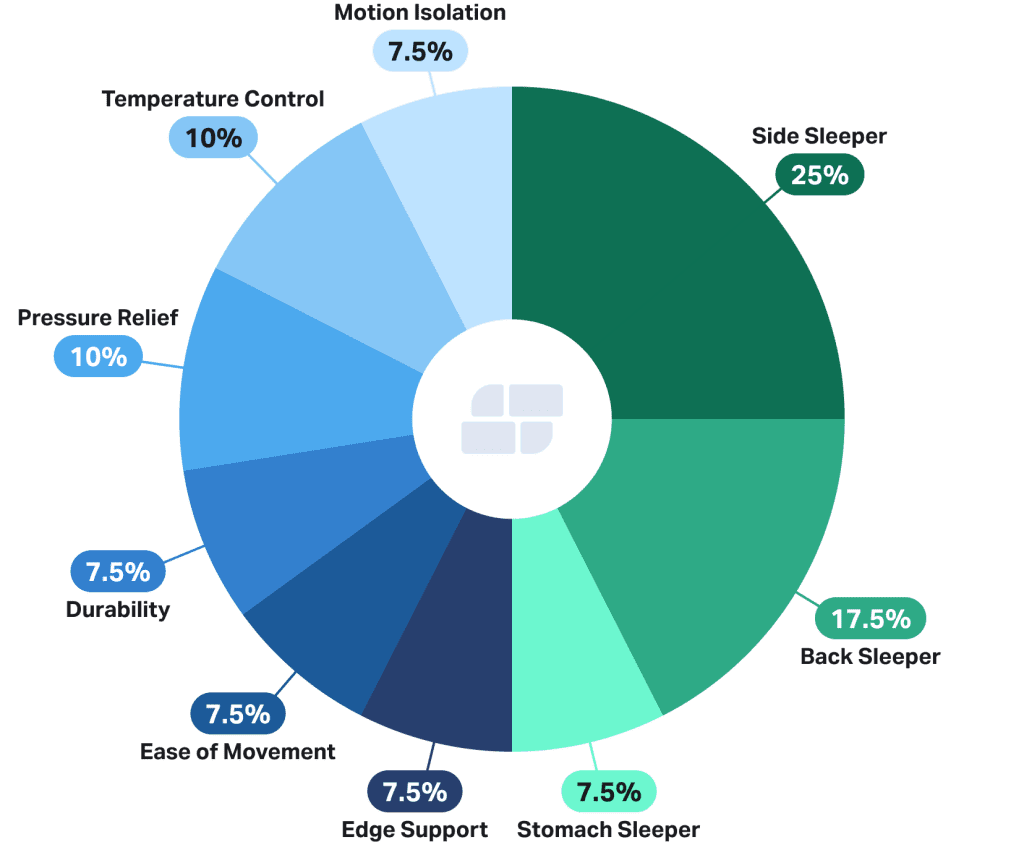
To determine a mattress’s overall score, we assign weighted percentages to performance categories based on how important they are to the individual sleep experience. For instance, areas like pressure relief and temperature control tend to matter more to people than something like edge support, and because more people sleep on their side and back than on their stomach, we weigh those positions more heavily.
Performance Categories
Motion Isolation
This is how much vibration a mattress absorbs when someone moves around on it. We measure this with a vibrometer, and the results help determine whether you’ll be woken up when your bed partner rolls over or gets in or out of bed.
Temperature Control
No one wants to wake up clammy and hot, so we perform temperature tests with a heat gun to see how much a mattress heats up and how quickly any built-up heat dissipates.
Pressure Relief
A bed with strong pressure relief excels at preventing pressure from building up in areas like the shoulders and hips. Beds with even contouring and weight distribution are top performers when it comes to pressure relief.
Durability
Durability refers to how well the mattress performs over time. In order to rate for this category, we make a predictive analysis based on the construction of the mattress. This includes what materials are used, the density of the foams, and the thickness of coils. We also update this rating qualitative assessments of how well these mattresses hold up after we’ve slept on them for years.
Ease of Movement
This category reflects how easy it is to move around on the bed’s surface. Materials like latex tend to get higher scores for ease of movement. As with testing edge support, we use kettlebells to determine how deeply a mattress compresses and how quickly it bounces back.
Edge Support
Mattresses with strong edge support provide a more dependable sleep surface because that translates to more usable surface area. We perform tests measuring how much the edges sink when you sit or lie down near the perimeter and how long it takes for the edge to return to its original shape.
More Mattress Guides by Price
For more help choosing the best mattress for your money, check out our other guides. Our team tests mattresses to determine the best options for different types of sleepers. To see how we’ve ranked mattresses in other performance categories, check out the product guides below.
Frequently Asked Questions
Are expensive mattresses better?
Expensive mattresses aren’t necessarily better than affordable ones. Some high-end models are constructed with materials like high-density memory foam, latex, and steel coils that help ensure a long lifespan and a good return on your investment. However, some inexpensive mattresses are comparable in terms of quality and performance.
How long does a mattress last?
The average mattress should be replaced after seven years of continuous use. Latex mattresses, hybrids, and foam models with high-density layers often last longer. Rotating your mattress head to foot every three to six months can prevent deep impressions from forming on your sleep surface.
When should you replace your mattress?
You should replace your mattress when you notice signs of moderate wear and tear. These include indentations in the surface measuring 1 inch or deeper, “trenching” down the middle, creaky springs, and rips or tears in the cover fabric. Check your warranty to see if these issues are covered as defects — you may be entitled to free repairs or a replacement mattress.
“The other important consideration is durability. A mattress is a significant investment meant to last many years, but cheap mattresses often lose their support and firmness relatively quickly, leading to higher costs over time due to frequent replacements,” says Dr. Adavadkar.
How are cheap mattress different from expensive ones?
It generally depends on which models and brands you’re looking at, but the materials and construction will likely differ the most. More expensive mattresses tend to use higher-end materials (think high-density memory foam, natural latex, and organic cotton) while you may find polyfoam, memory foam, and pocketed coils in the best cheap mattresses.
Where can I find the cheapest mattresses?
Many online retailers sell some of our favorite affordable mattresses, like Brooklyn Bedding, Bear, and Nectar.
What type of mattress is the cheapest?
All-foam or foam hybrid mattresses are some of the cheapest mattresses available. For this roundup, we only included models under $1,000 so as not to compromise durability.

Still have questions? Ask our community!
Join our Sleep Care Community — a trusted hub of product specialists, sleep health professionals, and people just like you. Whether you’re searching for the perfect mattress or need expert sleep advice, we’ve got you covered. Get personalized guidance from the experts who know sleep best.

